107 Exceptional Hamlet Essay Topics: Questions & Prompts

Every academic paper starts with a captivating idea, and Hamlet research paper or essay shouldn’t be an exception. In the list below, our team has collected unique and inspiring topics for you. You can use them in your writing or develop your own idea according to the format.
Here are some Hamlet essay topics for you:
- Elaborate on the weather in Denmark. How does it reflect the state of affairs and mood in the country? How does it change throughout the play? Start this Hamlet essay by describing the foggy weather in the first scene and gradually provide more examples as evidence.
- Think of irony in Hamlet . How and for what purposes did Shakespeare incorporate it in the play? Provide examples of the lines and situations that can be considered ironic.
- Reflect on Gertrude’s marriages. Why did she marry Claudius? Did they have an affair when King Hamlet was alive? Or did she agree on the new marriage to help the country?
- Compare and contrast Claudius and King Oedipus from Oedipus the King . What character traits do they share? Who is a better politician? Why?
- Explain whether you think Gertrude is on Hamlet’s or Claudius’ side. Did she switch the side by the end of the play? Analyze her conversation with Hamlet and how she later told Claudius that Hamlet was mad. Why did she drink the suspicious (poisoned) wine?
- Analyze the fact that dying Hamlet asked Horatio to spread his story. Will Horatio retell it without changes? Can he tell the truth about what happened at all?
- Examine an approach to violence in Hamlet . Are violence and aggression excessive in the play? How do characters react to it? Comment on how violence is mainly linked to vengeance.
- Consider the Ghost of Old Hamlet and all his appearances in Hamlet . Who saw him? Who do you think can see him? In your Hamlet essay, analyze every scene where he occurred and elaborate on why he did so.
- Talk about the relationship between Gertrude and Old Hamlet. Analyze what we know about their marriage and her reaction to her husband’s death. Did Gertrude see the Ghost in the scene with Hamlet? Could she have pretended that she didn’t?
- If Hamlet had survived, would he have been a good king? Analyze his strengths and weaknesses concerning the matter. Did he prove to be a good leader or politician in the play? Consider that Fortinbras explicitly stated that Hamlet could’ve become a good ruler.
- Elaborate on the way Hamlet killed Polonius in act 3, scene 4. Why did Hamlet act so quickly and calmly when he hesitates to kill his enemy, Claudius? Was this murder intentional? Did Hamlet regret it or freak out about it?
- Explore Hamlet’s mental state. How did grief affect him? His depression and suicidal tendencies are apparent. How do they change throughout the play?
- Compare Hamlet’s attitude towards the only women in the play, Ophelia and Gertrude. Why does he shame both of them for their sexual relationships? Examine his dialogues with his mother and his (ex)girlfriend, where he expresses cruelty. Elaborate on how his mother’s remarriage affected his relationships with the women.
- Examine the madness that Hamlet may or may not obtain. Thanks to his dialogue with Horatio, we know that he fakes his insanity. But could it have changed by the end of the play? What could’ve caused it? Analyze the evidence of his abnormal behavior and whether you can consider it natural, not acted.
- Analyze how Hamlet reflects on suicide. Provide examples from the soliloquies where Hamlet presumably tells the truth about his feelings. He considers suicide as an option, way out of the situation. Why doesn’t he commit it? Or was his death close to suicide?
- Consider whether the Ghost exists or not. A few people have seen him, but may it have been a case of mass hysteria? Hamlet may have gone mad over the death of his father and his mother’s remarriage. What if he imagined his dialogues with deceased King Hamlet? Provide evidence for that opinion or refute it.
- Elaborate on Hamlet’s trust issues. He suspects everyone from the start except for one person. Why does Hamlet trust Horatio? Analyze how the prince never lies during their conversations, even when the truth is a little insane. Why does Horatio believe everything he says?
- Examine friendship in Hamlet . Most of the relationships in the play are based on manipulation and benefit. Who can you see as friends in Hamlet ? Reflect on whether Hamlet values his friendship with Horatio. What can you say about Hamlet’s friends from childhood?
- Analyze the literary period during which Shakespeare came up with Hamlet . What features of the Elizabethan era does he illustrate in the play? Examplify various scenes and dialogues to prove your point.
- Consider prominent theatrical productions of Hamlet . How did they change over the centuries? What does modern theatre do that the Medieval one could not? Did theatrical performances evolve?
- Compare and contrast the original play and Lion King by Disney corporation. What are the key differences that were made in the cartoon? Why did Disney decide to come up with them? Analyze which version do you like more and why.
- Comment on the theme of death and mortality What events and objects made Hamlet obsessed with death? Elaborate on the role that religion plays in his considerations concerning the matter.
- Examine Claudius’ soliloquy . What’s its role in the play? What’s the crucial idea of his speech? Elaborate on the reasons why Claudius, the villain, has a soliloquy in Hamlet .
- Analyze all the symbols of death in the play What symbols from Hamlet refer to mortality? Speculate whether you can call fences, poison, unweeded gardens, flowers, and so on a symbol of death.
- Explore the conflicts of Hamlet . The play combines inner and outer conflicts, which are addressed mainly through Hamlet’s monologues. List the fundamental oppositions and lines that exemplify them.
- Reflect on Hamlet’s relationship with Gertrude Why is he upset with her? How does it affect his actions and opinion about all the women? Does Gertrude love her son?
- Analyze the setting of the play. Does the fact that Hamlet takes place in Denmark play any crucial role? Speculate why Shakespeare may have decided upon this country and support your opinion with evidence.
- Elaborate on Hamlet’s relationship with Ophelia. Does the prince consider her significant? Does he care about her? Compare how he treated Ophelia before and after her death.
- Comment on Hamlet’s religious beliefs Does religion have an impact on the prince’s decisions? Why is Hamlet considered a protestant? Prove your point by providing evidence from the play.
- Reflect on the theme of revenge Why does everyone value revenge in the play? Why do people passionately seek it in the society presented in Hamlet ? Elaborate on what impact it has on the characters’ motivations and decisions.
- Consider the language of Hamlet . Explain that Shakespeare’s play is well-known for its rich language and broad vocabulary. He composed a few characters who pay close attention to the words they say and hear. Why is language crucial for Hamlet?
- Examine Fortinbras. Who is he? Why is he a character foil for Hamlet? Analyze why he succeeded in everything he did and even became the king of Denmark.
- Analyze imagery and descriptions in the play. How does Shakespeare enhance each scene by alternating descriptions of the weather and nature? Provide examples of prominent images presented in the play and elaborate on their purpose.
- Compare Hamlet to Oedipus Rex . What do the characters of the famous plays have in common? Do they have a similar goal? Elaborate on how their character traits affect the endings of the respective plays.
- Explore the deception in Hamlet . What things and events are built on lies? Why and how do characters try to manipulate each other throughout the whole play?
- Elaborate on the imagery of rot and diseases How do unweeded gardens reflect the state of affairs? Explain how ill atmosphere foreshadows and represents problems caused by the actions of the royal court’s members.
- Comment on the role of Rosencrantz and Guildenstern in the play. Speculate whether they are simply comic relief characters or they have another purpose in Hamlet . Why did Shakespeare decide that he needed such characters in the play?
- Analyze Gertrude’s attitude towards Ophelia. Elaborate on the scenes where Gertrude communicates with Ophelia and mentions her. What does the queen think of her and her relationships with Hamlet? How does Gertrude comments on Ophelia’s death?
- Compare Hamlet’s and Horatio’s character traits. In what ways are they different and similar? What Horatio’s qualities Hamlet explicitly admires and lacks?
- Speculate on Shakespeare’s opinion about theatre. Examine a few references to the English stage of the Elizabethan era that the author put in the play in Act 2. How does he comment on the theatre of his own time through Hamlet’s lines of dialogue?
- Explore the relationships between Hamlet and Claudius. Why does Hamlet suspect his uncle from the start? Does Claudius think of Hamlet as dangerous? When does he become highly aware of his nephew’s capabilities?
- Consider the death of Rosencrantz and Guildenstern. When and how did they die? Why does a reader find out about it after the deaths of the royal family members? Speculate on the reasons why it was structured to be so anticlimactic. Why did W. S. Gilbert write a short comic play about them?
- Analyze the reception and comprehension of Hamlet . Why is it one of the most popular Shakespeare’s plays even today? Is it still relevant? Explain why nowadays our understanding of the play differs from the one from the writer’s era.
- Comment on the appearance vs. reality in Hamlet . Why do so many characters pretend to have another personality or obtain character traits that they don’t have? Why does Hamlet see through the pretense?
- Elaborate on Ophelia’s death . Was it a suicide, how gravediggers presumed, or an accident, as Gertrude claimed? Explain in your Hamlet essay the reasons for Ophelia to commit suicide. Did she have a choice?
- Reflect on political corruption. What characters represent corrupted politicians in the play? How do they manipulate public opinion?
- Analyze one movie adaptation of Hamlet . Write about the changes that were made in the film version. What differences from the play did you like? What changes were you surprised to see?
- Examine the political situation in the play. What war did Fortinbras lead? Why? How does it affect Denmark during the play and after it’s the last scene?
- Explore the role of women in Hamlet . The play presents the social norms that were relevant for people of this period. What parts of women’s lives did men explicitly control? Provide examples from the play.
- Compare Laertes and Hamlet . Laertes is known as Hamlet’s character foil. Examine similarities and differences in their character traits.
- Consider the doubt and indecisiveness of Hamlet . Why are such traits uncommon for the genre? What do they say about the prince as a character? Explain how these qualities affect the plot and Hamlet’s thought process.
- Elaborate on the symbolism in the play. Finding symbolism can be challenging as the interpretations differ. Some individuals consider particular objects as symbols, while others don’t. What do you view as examples of symbolism in the play? Why? What role do they play in understanding the story?
- Reflect on the Oedipus complex. Comment on whether Hamlet has it or not. Provide evidence from the play, especially from the scene with Gertrude, to prove your point. How can this idea be approached on the stage? Find examples of theatrical productions where Hamlet and Gertrude had a conversation in her closet.
- Compare and contrast Claudius and Polonius. What character traits do they have in common? Explain how they are not who they are trying to appear. Who is better at lying and manipulating others? Why?
- Examine how revenge affected characters in Hamlet . Three characters wish to avenge their fathers: Laertes, Hamlet, and Fortinbras. How does revenge affect their lives? Who succeeded in getting their revenge?
- Consider the family theme. What role does family play for various characters? Elaborate on how blood ties motivate multiple characters.
- Reflect on Yorick’s role in the play. Who was Yorick? What impact did he have on Hamlet during the prince’s childhood and present time? Elaborate on how Yorick led Hamlet to his last soliloquy.
- Analyze the religious conflict of the play. How did events from Shakespeare’s time affect the theme of religion? Explain how Hamlet presents the conflict between Protestantism and Catholicism through the prince and King Hamlet.
- Comment on the theme of madness. Who went mad in the play? Compare Hamlet’s and Laerte’s insanity to Ophelia’s one. How was her madness different from the other examples?
- Explore Polonius’ character. What was Polonius’ motivation throughout the play? Whom did he manipulate, and why? Explain why he tried to appear a good person and a parent.
- Elaborate on the reasons why Hamlet is the protagonist of the story. What makes him a tragic hero? Why is he considered a good person after every crime he committed and every cruel thing he said to his mother and Ophelia?
- Think of the conflict of good and evil. What imagery is associated with each of them in the play? Does evil spread like a disease?
- Explain how Hamlet differs from other plays of Shakespeare’s time . What new features and connections within the story did the writer present? How did Shakespeare make characters contribute to the plot?
- Analyze the “To be or not to be” speech. It’s one of the most famous lines in history, but what meaning is behind it? Elaborate on the circumstances around the monologue and whether Hamlet is partially lying.
- Reflect on performances of Hamlet. Choose a couple of performances on the stage or in a movie and compare them. Whose version of the character you prefer and why?
- Elaborate on the movie Ophelia (2018). What’s intriguing about a story told from Ophelia’s point of view? Exemplify the differences from the original play and how the change of perspective affected the story.
- Explore Hamlet’s obsession with inaction and action . What stops Hamlet from acting decisively? Exemplify situations from the play when characters act quickly, without any doubt compared to Hamlet’s almost constant hesitance.
- Compare Hamlet and King Lear. What similar character traits have an impact on the respective plays? Can we call the prince and the king victims of the social norms?
- Think of how the play’s themes are relevant nowadays . Which of them remained timeless, relevant for any period? Are any themes become obsolete and useless in today’s world? Elaborate on each theme separately with examples from the play.
- Reflect on Hamlet’s mood swings . Provide examples of how the prince’s mood affects his actions and speech. What can and did influence his mood?
- Examine Polonius’ death. Why was he hiding behind the tapestry during the scene? Was it his idea? How did he die? Elaborate on irony in the way he was murdered. How did it affect the plot?
- Analyze Hamlet as an actor. Is he good at playing a character? Elaborate on his dialogue with the First Player and his opinion about acting.
- Consider the motif of betrayal. Who betrays Hamlet? Explain how the attitude towards this act varies from character to character. How does Hamlet’s betrayal affect Ophelia?
- Explore the connection between honor and revenge . Explain why it’s the principal motivation for such characters as Hamlet, Laertes, and Fortinbras. Comment on scenes where it reveals itself through actions and conversations.
- Elaborate on Hamlet’s death. Was it the only logical conclusion for Hamlet’s psychological and emotional development? Was he satisfied?
- Comment on the genre of the play . Can we call it revenge tragedy without any reservation? How did Shakespeare ruin the genre by Hamlet ?
- Compare Hamlet and the Ghost. What can you say about the language that the characters use? List the lines that state that Hamlet and the Ghost look similar.
- Think of the father-son relationships in the play . Analyze the relationships between Hamlet and King Hamlet and compare them to those of Laertes and Polonius. Which features are common for both of them?
- Elaborate on the name Hamlet . What does it mean? What’s its country of origin? Add a sentence or two about Amleth.
- Consider allusions to historical figures in the play. Why does Hamlet mention Alexander the Great and Julius Caesar in act 5? Why did Shakespeare include allusions at all?
- Examine soliloquies in Hamlet . What’s their role in the play? Provide lines from soliloquies that let us dive into the thoughts and intentions of a character. Does anyone lie during such a speech?
- Compare the two film adaptations of the play. Elaborate on different film techniques and alterations of the plot. Concentrate on one scene in particular and explain what changes were made.
- Explore Hamlet’s nihilism. When does Hamlet start to display features that are inherent to this school of thought? Explain how the prince came to nihilism, what pushed him to this.
- List the most painful moments of Hamlet’s life and elaborate on them. Include events that happened before the first act and within the play. Prove your point with evidence from the prince’s lines.
- Think of what poison represents. What does it refer to? Who dies from poison in the play?
- Consider the play from the public’s perspective. How does Claudius manipulate the public’s opinion? What do people think of the new king and Hamlet?
- Compare and contrast Gertrude and Ophelia. What traits do they have in common? Explain differences and similarities in their affection towards Hamlet. Who controls these women?
- Elaborate on the villain of the story. Who can be considered an antagonist of the play? Why do some people regard Hamlet as a villain?
- Imagine how Hamlet could’ve reacted to modern society. What aspects of the future would he appreciate? What social norms would shock him? Would he be more comfortable in our period?
- Evaluate all the relationships in Hamlet’s life. What’s the most significant one? Why? What relationships changed throughout the play?
- Comment on contradictions in the play. What contradictions does Hamlet face? Is he himself a contradictory character? Provide examples of Hamlet’s contradictions
- Explore the fencing in the last scene of Hamlet . What does it contribute to the story? Does it affect the end of the duel?
- Elaborate on the gravediggers. How did their job affect their attitude towards death? Comment on their humor and whether it’s a coping mechanism. Does it illustrate their perception of life?
- Compare Claudius and King Hamlet. What qualities differentiate them? What do they have in common? Speculate on who was a more talented politician and a better leader.
- Think of comic relief in Hamlet . Comment on how Polonius, Osric, gravediggers, and Hamlet’s dialogues with them enlighten the mood. Was the humor appropriate for revenge tragedies before Shakespeare?
- Consider foreshadowing in the play. What events are foreshadowed early on in Hamlet ? Present lines and features from act 1 that indicate the tragic end.
- Elaborate on justice and truth . How does Shakespeare show attitude towards justice common for this time? Does Hamlet approach fairness differently from the others? Elaborate on how Hamlet both pursue the truth and ignores it.
- Examine the “Get thee to a nunnery, go.” sentence. Why did Hamlet say so to Ophelia? What made the prince think that she was vicious?
- Comment on Hamlet’s cruelty. When does Hamlet become cruel towards other characters? Is he cruel towards himself? Analyze situations where Hamlet talks viciously and whether it’s intentional or not.
- Explore Hamlet’s character . Why is the prince such an unusual figure for revenge tragedies? Explain how Shakespeare created the hero who struggles to act with firmness and constantly reflects on his actions and decisions. Is he easy to understand and relate to?
- Analyze the play within the play. What’s its role in plot development? Why did Hamlet let the play take place? Explain what scene he added and why. Elaborate on the title The Mousetrap .
- Examine the consequences of revenge . What conclusion does Shakespeare provide for the theme of revenge? Explain how does it influence the deaths of Hamlet and Laertes, the absolute victory of Fortinbras.
- Reflect on Hamlet’s hesitance to kill Claudius . Why does he consider murdering his uncle in act 1? What stops him? Illustrate all the occasions when Hamlet could’ve killed Claudius but didn’t, and one time he did. What pushed him in the end?
- Compare Claudius to Laertes. Are there any similarities? How do these characters form an alliance by the end of the play?
- Comment on Gertrude’s guiltiness . Hamlet considers his mother guilty of too many crimes, but was she guilty of anything? Speculate whether she participated in King Hamlet’s murder or had an affair with Claudius before her husband’s death. Was she loyal to Hamlet?
- Elaborate on the “Something is rotten in the state of Denmark …“ line. Who says it? Explain the context of the line, its meaning, and what it foreshadows.
- Examine Polonius’ advice to Laertes. Provide its meaning and reflect on Polonius’ intentions. Why is this speech ironic?
Thanks for checking our list! You can consider some free Hamlet samples or other articles about the play, following the links below.
- Share to Facebook
- Share to Twitter
- Share to LinkedIn
- Share to email

Study Guide Menu
- Summary & Analysis
- Genre & Literary Analysis
- Important Quotes
- Essay Topics
- Essay Samples
- Chicago (A-D)
- Chicago (N-B)
IvyPanda. (2023, August 14). 107 Exceptional Hamlet Essay Topics: Questions & Prompts. https://ivypanda.com/lit/hamlet-study-guide/essay-topics/
"107 Exceptional Hamlet Essay Topics: Questions & Prompts." IvyPanda , 14 Aug. 2023, ivypanda.com/lit/hamlet-study-guide/essay-topics/.
IvyPanda . (2023) '107 Exceptional Hamlet Essay Topics: Questions & Prompts'. 14 August.
IvyPanda . 2023. "107 Exceptional Hamlet Essay Topics: Questions & Prompts." August 14, 2023. https://ivypanda.com/lit/hamlet-study-guide/essay-topics/.
1. IvyPanda . "107 Exceptional Hamlet Essay Topics: Questions & Prompts." August 14, 2023. https://ivypanda.com/lit/hamlet-study-guide/essay-topics/.
Bibliography
IvyPanda . "107 Exceptional Hamlet Essay Topics: Questions & Prompts." August 14, 2023. https://ivypanda.com/lit/hamlet-study-guide/essay-topics/.
by William Shakespeare
Hamlet essay questions.
Hamlet is widely hailed as the first modern play in the English language. Which characteristics of its central character might account for this label?
Hamlet is considered the first modern play partly because of the psychological depth of its main character -- Hamlet suffers from melancholy, self-doubt, and even delusions. The audience never quite knows what Hamlet is thinking, or what is real. In fact, Hamlet himself declares again and again that he doesn't understand his doubts either ("I have of late, but wherefore I know not , lost all my mirth.")
Death is a constant presence in this play. Does Hamlet's speech to Yorick's skull represent a philosophy of death? How does his attitude toward death differ from that of the gravediggers?
Death was a much more ordinary presence in Elizabethan England than it is in the modern world. Infant mortality was high and plagues swept whole nations. In this sense, the gravediggers exhibit a much more realistic approach to death than most people. Hamlet uses the occasion for a more general examination of mortality. His attitude toward death is not necessarily inconsistent with that of the gravediggers, but it is different in his emphasis on metaphysical rather than physical implications of death.
Does the text hold up to a Freudian reading of Hamlet's relationship with his mother? How does Hamlet's relationship with Ophelia support, complicate or work against an Oedipal interpretation of the play?
Certainly Hamlet does visit his mother's bedchamber, and is immensely interested in her sexual relationships with other men, both of which are classic elements of an Oedipal complex. Freud's reading of the play may have influenced his sexual theories—but it is important to remember the order of events, especially because scholars tend to label Hamlet "Freudian." Better stated, Freud is Shakespearean, not the other way around.
"To be or not to be" is the famous question that Hamlet poses in Act Three, Scene One. Explore this speech. What does he mean by this famous question? What events of the play prompt this speech?
Hamlet is musing about death, but whose death, or what kind of death, is frustratingly difficult to pin down. He is perhaps contemplating suicide, perhaps thinking about the risks he must run in order to fulfill the task of revenge. He has an audience of Ophelia, Polonius and Claudius, who are eavesdropping on him; but he most likely does not realize that they are present.
The play within a play, the long soliloquies wherein Hamlet faces the audience and speaks to them directly, the vivid discussions of whether or not Hamlet is "acting" mad -- there are many elements of Hamlet that call attention to its status as a play, rather than reality. By showing the trappings of theater and non-reality, does Shakespeare make Hamlet's suffering seem more acute or more distant? How?
"Life's but a stage," another Shakespearean character proclaims, and the playwright recognized quite well the dramatic trappings of life and the life-like elements of staged productions. Soliloquies are modern in that they break what is much later termed the "fourth wall" separating audience from stage; the character speaks directly to the audience. Although the whole atmosphere seems patently false and theatrical, this serves to draw Hamlet somehow closer. Somehow, the effect of such "metatheatrical" gestures is to show not how different acting is from life, but how similar life is to acting.
In terms of the usual categorizations, Shakespeare's tragedies end in death, his comedies in marriage. By this measure, Hamlet is a tragedy. But Shakespeare's best plays are a tragicomic mix. Choose and discuss two comical or farcical elements in Hamlet.
The scene with gravediggers is a good example of tragedy mixed with comedy. The work is morbid, but the workers joke and sing as they go about their business. They seem totally unaware of the majestic tragedy unfolding itself in the castle nearby. On a smaller level, Yorick's skull embodies the tragicomic dichotomy; it is a gruesome, deathly object that once belonged to a joker. There are several other comic scenes, including much of Hamlet's dialogue with Rosencrantz and Guildenstern, and most of Polonius' scenes before his death. This gruesome mixture of pathos and humor is the essence of Shakespearean theater.
Define revenge. Is Hamlet a traditional revenge play? What other forces are at work in Hamlet's psyche?
Revenge is traditionally the cold-blooded pursuit to make up for one hurt with a strike against its perpetrator. Revenge is usually violent. Hamlet is hardly a traditional play of revenge, because the main character is so uncertain and ambivalent about both the original strike and what he should do about it. Melancholy and uncertainty play just as large a role in Hamlet's character as the desire for revenge.
Discuss the setting of Hamlet. What effect does setting the psycho-drama in a bleak northern castle -- similar to that in Macbeth -- have on the characters and audience?
From the script, the audience gathers that Elsinore Castle is a remote place in northern Europe. Not much else is known: there were no sets in Shakespeare's time. But the setting certainly matches Hamlet's melancholy mood, and the isolation of the place helps make the violence and implied incest believable.
The play begins with the fantastical appearance of a ghost. Are we meant to believe that this is really Hamlet's father, or is he a figment of Hamlet's imagination? If he is imagined, is the rest of the play imagined as well?
Hamlet struggles with the question of whether the ghost is his father and decides that he must be who he says he is. The audience remains in doubt, however, because of the ghost's claim that he comes from Purgatory (blasphemous in Elizabethan England), and the fact that Gertrude is unable to see it when it appears to Hamlet in her chamber. One of the moral questions of the play is resolved, however, when it becomes clear that Claudius is a murderer. Whether the ghost is Old Hamlet or a demon, he has told the truth about Claudius' guilt.
Can a healthy state be presided over by a corrupt ruler? Shakespeare draws frequent comparisons between the moral legitimacy of a leader and the health of a state. Is Denmark's monarchy responsible for the demise of the state in this play?
At the end of the tragedy, it is not only Hamlet and most of the characters who die. The entire state of Denmark fails after Norway invades, and the health of the nation seems very much wrapped up with the moral state of the leader. This accords with the medieval idea of the "body politic" with the leader making up the head, literally, and the people the body of a personified state.

Hamlet Questions and Answers
The Question and Answer section for Hamlet is a great resource to ask questions, find answers, and discuss the novel.
Describe Fortinbras based on what Horatio says.
Do you mean in Act 1? Based upon Horatio's description, young Fortinbras is bold, inexperienced, and willing to do anything to regain his father's lost lands.
Why is a clock mentioned in Hamlet. There weren’t any clock’s in Hanlet’s time.
Yes I've heard this question before. This is called an anachronism. It is an inconsistency in some chronological arrangement. In this case, there were clocks in Shakespeare’s time but not in Hamlet's. Shakespeare wrote it in because he thought it...
Hamlet’s obsession with the partying going on inside the castle while he stands watch with Horatio mainly suggests that he .
D. feels that King Claudius wants to hide his evil with merriment
Study Guide for Hamlet
Hamlet study guide contains a biography of William Shakespeare, literature essays, a complete e-text, quiz questions, major themes, characters, and a full summary and analysis.
- About Hamlet
- Hamlet Summary
- Hamlet Video
- Character List
Essays for Hamlet
Hamlet essays are academic essays for citation. These papers were written primarily by students and provide critical analysis of Hamlet by William Shakespeare.
- Through Rose Colored Glasses: How the Victorian Age Shifted the Focus of Hamlet
- Q to F7: Mate; Hamlet's Emotions, Actions, and Importance in the Nunnery Scene
- Before the Storm
- Haunted: Hamlet's Relationship With His Dead Father
- Heliocentric Hamlet: The Astronomy of Hamlet
Lesson Plan for Hamlet
- About the Author
- Study Objectives
- Common Core Standards
- Introduction to Hamlet
- Relationship to Other Books
- Bringing in Technology
- Notes to the Teacher
- Related Links
- Hamlet Bibliography
E-Text of Hamlet
The Hamlet e-text contains the full text of the play Hamlet by William Shakespeare.
- List of Characters
Wikipedia Entries for Hamlet
- Introduction
140 Hamlet Essay Topics
One of Shakespeare’s most iconic plays is Hamlet. Set in Denmark, it tells the story of Hamlet, a young prince who becomes aware of his father’s death and seeks revenge against his mother Gertrude by killing her new husband, Claudius.
The play is a thrilling roller coaster ride of emotions, with themes such as lust, love, betrayal, and revenge present throughout the story.
Hamlet Essay Writing
Usually first studied in high school literature classes, Hamlet’s many themes have been the subject of many essay writing assignments. Whether it’s an argumentative, persuasive, or analytical essay, the trick to writing about Hamlet lies in the following steps.
Understand the Reading
The key to writing about Hamlet is understanding it. Shakespeare wrote in a much different way from modern literature, so it takes time for many to understand the writing or where the author is going.
To better understand the play, it may be necessary to read it multiple times. It can help to mark specific sections with a color-coded or annotation system. If you color code the reading, use different colored highlighters designated to a particular theme, symbol, character, or event to mark several passages. If annotating, use a pencil or pen to underline, circle, or write notes in the margins of important passages.
By marking the reading as you go through it, you develop a better idea of how each symbol relates to the others and the overall story.
Choose a Topic
Once you have read through the play and made notes detailing the significant themes, symbols, and characters, it is time to choose a topic. There are many different ways to approach the essay, depending on what you feel will make for the best argument or story.
Pick a topic that interests you and can be backed by the number of examples you have highlighted or noted while reading the play. If you are having trouble choosing a topic for a Hamlet essay, consider using any of the 140 Hamlet essay topics at the bottom of this article.
Create a Strong Thesis Statement
Once you have chosen a topic, it is time to create your thesis statement. A thesis statement on Hamlet should include the topic your essay will focus on, as well as an argument that your textual evidence can support. For example:
“The role of women in Hamlet is significant to understanding the meaning behind revenge.”
“Hamlet’s lust for Gertrude affects his ability to carry out his plan for revenge.”
“It can be argued that Hamlet is trapped in a cycle of revenge and cannot escape until the ghost gives him permission to do so.”
These thesis statements clearly state what your essay will focus on and can be backed up with examples from the play.
Hamlet Essay Structure
Once you have the key steps above completed, it’s time to start drafting your Hamlet essay.
Introduction
Start with a compelling hook that draws the reader in. For example, compelling opening sentences for Hamlet essays could be something like:
“In a time when women were expected to be silent…”
“Hamlet’s lust for his mother…”
“In a world where revenge…”
After the hook, you’ll want to include pertinent background information to help the reader understand your essay. For example, if you are writing about the role of women in Hamlet, begin with a brief summary of King Hamlet’s death and how it affected his family before getting into specific examples from the play that show the role of women.
Finish your introduction with a strong thesis statement that lays out the essay’s overall argument.
The body paragraphs should go logically from the least crucial point to the most vital, usually with one to three examples per paragraph. Use quotations from the play where possible, and remember to include any subtleties that tie back into your thesis statement.
Pro Tip: When quoting lines from Hamlet, be sure to reference them in the correct format. Depending on the style, this may require using parenthetical notation to reference the act, line, and scene, written as (1.2.41)
Your conclusion should summarize what you have said during your essay and tie up any loose ends that were left.
For example, if your essay began with a summary of King Hamlet’s death and how it affected his family, be sure to end the essay by reiterating how that loss impacted Hamlet’s life.
This is also where you can bring up any implications or possible future developments based on what has happened in the play to tie it back into the overall argument.
Pro Tip: Remember that a well-written essay will include fewer examples and more textual evidence instead of a long list of facts without any supporting quotes from the play. Include as much detail as possible about each example or instance you bring up in your essay to strengthen your argument and show your reader how each point is relevant to the topic.
Choosing the right topic for your Hamlet essay can be challenging. Fortunately, this list of 140 Hamlet essay topics is perfect for students writing about the famous play.
Hamlet Essay Topics About Tragedy
- Discuss the tragedy of Hamlet and how it affects his life
- Analyze how tragedy is represented through literary devices throughout Hamlet
- Compare and contrast Hamlet’s various tragedies in terms of literary devices
- Discuss how Hamlet’s tragedies are reflected through the characters in the play
- Analyze the effect of death on both Hamlet and his family/friends
- Compare/contrast Queen Gertrude’s tragedies to Lady Macbeth’s
- Analyze how death functions as a literary device throughout Hamlet
- Discuss whether or not Hamlet is truly a tragic hero
- Compare and contrast the portrayal of tragedy in Hamlet and Romeo & Juliet
- Discuss how Hamlet’s tragedies could have been avoided
- Would it still be considered a tragedy if Hamlet happened in modern times?
- Reflect on the theme of tragedy as it pertains to Hamlet
- Which character in Hamlet experiences the worst tragedy, why?
- How does the theme of tragedy compare with the other themes in Hamlet?
- When does the tragedy of Hamlet become noticeable as the play progresses?
- Why is Hamlet considered a tragedy?
- Do you think that Hamlet is one of Shakespeare’s best or worst tragedies?
- How could the tragedy have been avoided in Hamlet?
- Would better communication between the characters have prevented the tragedy in Hamlet?
- Who is more of a tragic hero, Hamlet or Othello? Why?
Hamlet Essay Topics About Revenge
- Discuss why Hamlet’s plan to seek revenge is an internal conflict
- Analyze how Hamlet deals with his desire for revenge after learning of his father’s death
- Compare and contrast Claudius’ and Macbeth’s quests for power that leads them to take a life
- Analyze whether or not Hamlet’s motivations can be justified as revenge
- Discuss the role of revenge and vengeance in Shakespeare tragedies (e.g., Othello, Macbeth, Romeo & Juliet)
- Analyze how revenge is portrayed in Hamlet
- Compare and contrast taking revenge on Claudius to Ulysses’s quest for revenge in The Odyssey
- Discuss the concept of suspicious minds throughout Hamlet
- Identify examples of extreme suspicion in Hamlet
- Discuss the literary devices used to express suspicion in Hamlet
- Analyze the impact of suspicious minds on Hamlet and his family/friends
- Analyze the role of urgency in Hamlet: Is it a necessary part of revenge?
- Is revenge justified in Hamlet? Discuss your answer.
- Hamlet is often considered an anti-hero. Why do you think that is?
- How would the story have been different if Hamlet had taken revenge sooner?
- What does Shakespeare achieve through his portrayal of revenge in Hamlet?
- Which character in Hamlet gets the most out of their revenge?
- Is revenge ever warranted in any situation? Discuss why or why not.
- How would modern-day society view Hamlet’s revenge plot?
- Compare and contrast the themes of revenge in Hamlet with a modern-day literary work
Hamlet Essay Topics About Women in Hamlet
- Analyze how women are portrayed in Shakespeare’s Hamlet
- Compare and contrast Lady Macbeth and Gertrude in terms of their relationships with the men in their lives
- Discuss the role of gender politics throughout Hamlet
- Analyze how Gertrude is treated by her husband, son, and the other characters in the play
- Analyze Gertrude’s role as Queen of Denmark
- Analyze how Shakespeare uses women to convey the political atmosphere of Denmark during this period
- What is the significance of the women in Hamlet?
- How do male-female relationships function throughout Hamlet?
- Compare and contrast the portrayal of women in Shakespeare’s Othello with that of Hamlet
- If Hamlet was written today, how would the female characters be portrayed?
- Was there any significance behind Claudius’ betrothal to Gertrude?
- Discuss the importance of Ophelia’s death in Hamlet
- How do women convey the theme of revenge throughout Hamlet?
- Did Gertrude love Claudius, or was she forced into marriage with him?
- Is any female character redeemed in Hamlet?
- How does gender function as a theme in Hamlet?
- Would a female director’s vision of the play be drastically different from a male director’s?
- Discuss whether or not women stand up for themselves throughout Hamlet.
- Analyze why Gertrude commits suicide at the end of Hamlet
- How do women convey madness, desire, and revenge themes in Hamlet?
- Do you think that Shakespeare was critical or supportive of women throughout his works?
- Is Gertrude just as guilty for Hamlet’s death as Claudius is?
- Analyze whether or not Shakespeare has a feminist or misogynistic view of women in Hamlet.
Hamlet Essay Topics About Grief
- Analyze the role of grief in Hamlet
- Discuss the various ways that characters deal with grief throughout Hamlet
- Analyze Laertes’ main motivation for seeking revenge on Claudius
- Compare and contrast how different characters are affected by grief in Hamlet
- Analyze whether or not Laertes is a reliable source of information in the play
- Analyze whether or not Hamlet is actually living up to his name throughout the play
- What does Shakespeare mean when he says that “the readiness is all”?
- How are the characters’ feelings about death conveyed in Hamlet?
- How does grief influence the actions of various characters in Hamlet?
- Which theme is more prevalent in Hamlet – grief or madness?
- What is the significance of Ophelia’s death in Hamlet?
- Would modern-day society view grief as a valid motivation for revenge?
Hamlet Essay Topics About Madness
- Analyze the various ways that insanity is manifested in Hamlet
- Discuss how Shakespeare uses madness to convey themes of grief and revenge in Hamlet
- Compare and contrast Hamlet’s riddling with The Tempest’s concept of magic
- What is the significance of the “ghost” scene in Act 1, Scene 4?
- Is Hamlet genuinely insane?
- Does Ophelia go mad, or does she purposefully act that way?
- Does Claudius’ desire for power drive him into insanity?
- Analyze whether or not all of the characters in Hamlet are truly insane.
- How does insanity function as a theme throughout Shakespeare’s play?
- What is the significance of Laertes’ recovery from his madness, and how does it affect the plotline?
- Compare and contrast Gertrude’s sanity at the beginning of the play with her sanity at the end.
- How does insanity manifest itself throughout Hamlet?
- Which literary devices are the most essential for depicting the scope of madness experienced by characters in Hamlet?
Hamlet Essay Topics About Power & Corruption
- Analyze the role of power dynamics within families in Hamlet
- Discuss Claudius’ motivations for murdering his brother and marrying Gertrude
- Analyze the significance of the name “Hamlet” throughout Shakespeare’s play.
- Compare and contrast how different characters respond to their loss of power or status in the play.
- Discuss the theme of corruption throughout the play.
- Does power corrupt Claudius?
- Are there any characters in the play that do not experience some form of loss of power, status, or nobility?
- Compare and contrast Rosencrantz and Guildenstern with Laertes
- How would the pursuit of power in Hamlet be viewed in modern times?
- Is there a specific character that is corrupted or corrupting throughout Hamlet?
- Discuss whether the theme of corruption exists more prominently in The Lord of the Flies or Hamlet.
- What does Shakespeare mean when he says, “one may smile, and smile, and be a villain”?
- Was one character’s quest for power the only thing going on in the play?
- How do the themes of corruption and power in Hamlet mimic modern-day events?
- What are the most significant changes throughout Hamlet in terms of power dynamics?
- Which characters are corrupted by their pursuit of power, and which are not?
- How does Shakespeare convey the theme of corruption through literary devices?
- How does Shakespeare critique corruption and power in Hamlet?
- Are there any characters that display no form of corruption after experiencing significant events in the play?
Hamlet Essay Topics About Jealousy
- Analyze how the theme of jealousy plays out throughout Hamlet
- Which characters in Hamlet express feelings of jealousy and why?
- Compare and contrast Hamlet’s relationship with Ophelia to that of Laertes’ relationship with Ophelia.
- How does Shakespeare use jealousy as a literary device?
- Do you think Gertrude is justified in her feelings towards Ophelia?
- Does Laertes’ understanding of his sister’s relationship with Hamlet influence his decision to fight in the duel?
- What motivations do Hamlet and Laertes have in fighting in a duel with one another?
- Compare and contrast Claudius’ feelings of envy when he hears of Fortinbras’ men passing by with the jealousy Laertes experiences towards Hamlet.
- Does the theme of jealousy exist throughout the play?
- How does Shakespeare portray the characters that experience feelings of jealousy in Hamlet?
- Which character’s jealousy is most detrimental to their relationships with others?
- What impact do Gertrude’s feelings for Claudius have on the play?
- How does Shakespeare subtly convey feelings of jealousy through his use of language and literary devices?
Hamlet Essay Topics About Friendship
- How do Ophelia’s feelings of loss influence her decisions to act in certain ways throughout the play?
- What is the significance of Rosencrantz and Guildenstern betraying Hamlet?
- Analyze whether or not Gertrude’s friendship with Claudius contributes to her betrayal of Hamlet.
- How do the relationships between characters in Hamlet evolve throughout the play?
- How does Shakespeare portray friendships in Hamlet?
- Which character displays the most loyalty to another, and why?
- What is the significance of Ophelia’s relationship with her father, Polonius?
- What do you think Shakespeare thought about friendship based on Hamlet?
- What is the importance of Hamlet’s relationship with Horatio?
- How does Shakespeare portray friendships in his use of language and literary devices?
- How would you define friendship based on your analysis of Hamlet?
- Is it possible for someone who betrays another person to be considered a friend?
Hamlet Essay Topics About Morality
- Rosencrantz and Guildenstern do not experience as much change as the primary characters of the play from good to evil.
- In what ways has Claudius changed since he came to power?
- How would someone who has killed a person be viewed in modern society?
- Compare and contrast Laertes’ actions with those of Hamlet’s.
- Does Shakespeare explore immorality or morality in Hamlet?
- Do you think Claudius can be saved from damnation in the eyes of God?
- What impact do recent events in the play have on Hamlet’s decision to avenge his father’s death?
- How does Shakespeare portray morality in his use of language and literary devices?
Related Posts
- 120 College Essay Topics
- 90 Heart of Darkness Essay Topics
- 135 US History Essay Topics
- 130 Informative Essay Topics
- 125 Cause and Effect Essay Topics
Categories:
- Essay Samples
- Essay Topics
- Essay Writing Guides
Recent posts:
- 170 Ethics Essay Topics
- 160 Satire Essay Topics
- 160 Rhetorical Essay Topics
- 155 Criminal Justice Essay Topics
- 150 Political Essay Topics
- 145 Classification Essay Topics
- 140 Sociology Essay Topics
- 140 Opinion Essay Topics
- 140 Environmental Essay Topics
- 135 Controversial Essay Topics
- 125 Classification and Division Essay Topics
- 120 Literary Essay Topics
- 100 Profile Essay Topics
- 80 Holocaust Essay Topics
Testimonials

353 Hamlet Essay Topics & Ideas
18 January 2024
last updated
Hamlet essay topics delve into the deep, convoluted world of Shakespearean tragedy, focusing on various themes, such as revenge, mortality, madness, and moral corruption. These topics provide a rich exploration of Hamlet’s internal struggles and existential crises, his complex relationships with characters, like Ophelia, Gertrude, and Claudius, and his philosophically profound soliloquies. They also invite analysis of the play’s symbolism, motifs, and underlying social and political commentary. Delving into these subjects, students can contrast Hamlet’s contemplative nature with the impulsive behavior of other characters, scrutinize the impact of the supernatural, or dissect the tragic elements that lead to Hamlet’s downfall. From examining the ambiguity of characters’ actions to questioning the meaning of life and death, Hamlet essay topics offer many critical lenses through which students can understand and interpret this famous work of literature.
Best Hamlet Essay Topics
- Exploring the Concept of Revenge in Hamlet
- Uncertainty in Decision Making: A Deep Dive Into Hamlet’s Indecisiveness
- Madness as Portrayed in Hamlet: Real or Feigned?
- Polonius as a Catalyst in the Tragedy of Hamlet
- Interpreting the Significance of Ophelia’s Death
- Hamlet and the Oedipus Complex: Analyzing Freudian Themes
- Claudius’ Manipulation Techniques in Power Consolidation
- Betrayal in Hamlet: Who Betrays Whom and Why?
- A Comparative Study: Hamlet and the Elizabethan Era
- Unpacking the Metaphor of Yorick’s Skull
- Aesthetic Symbolism in the Mousetrap Play Within Hamlet
- Laertes and Hamlet: A Study in Contrasts
- Death and the Afterlife: How Does Hamlet Approach Existential Questions?
- Soliloquies in Hamlet: Window Into the Prince’s Soul
- Shakespeare’s Hamlet: A Feminist Interpretation
- Hamlet’s Paralysis of Action: Causes and Consequences
- Exploring Misogyny and Power Structures in Hamlet
- Existential Crisis in Hamlet: A Modern Interpretation
- Supernatural Elements in Hamlet: Apparition as a Narrative Device
- Shakespeare’s Use of Foils in Hamlet: Purpose and Effectiveness
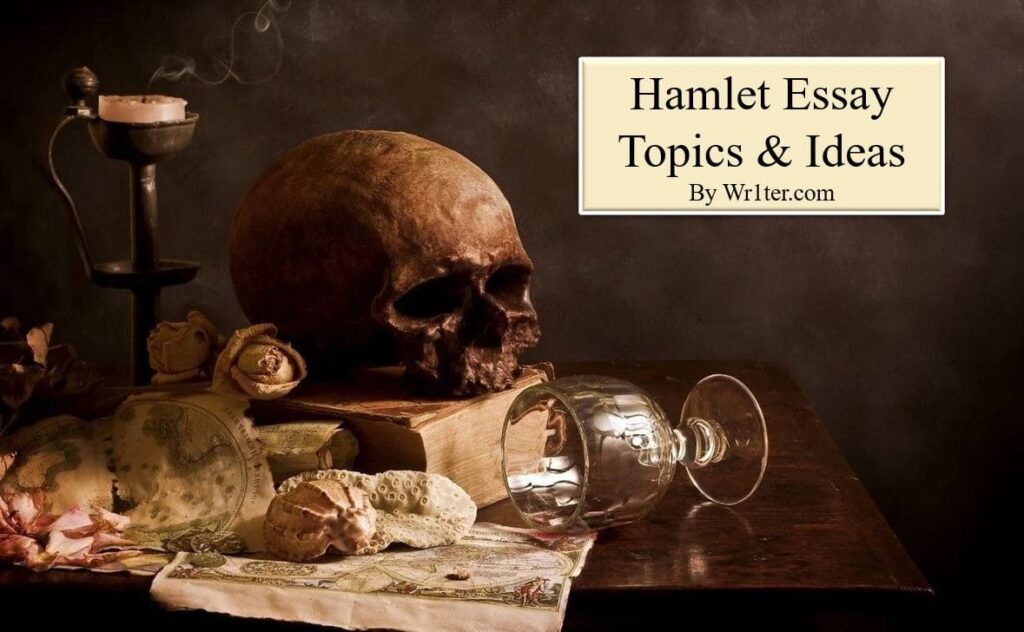
Easy Hamlet Essay Topics
- Hamlet’s Tragic Flaw: Procrastination and Its Consequences
- Understanding the Ghost of Hamlet’s Father
- Analysis of King Claudius as Hamlet’s Adversary
- Significance of the Play-Within-a-Play in Hamlet
- Examining Hamlet’s Relationship With Gertrude
- The Portrayal of Love and Relationships in Hamlet
- Major Themes in Hamlet: A Comprehensive Review
- A Closer Look at Hamlet’s Soliloquies
- Character Analysis: Is Polonius Truly Wise?
- Duplicity and Deception in Hamlet’s Denmark
- Hamlet’s View on Life and Death
- Comparing Hamlet and Laertes: A Study of Similarities
- Symbolism in Hamlet: An In-Depth Study
- Fortinbras as a Parallel Character to Hamlet
- Fate vs. Free Will in Hamlet’s Narrative
- Decoding the Importance of Dreams in Hamlet
- Understanding the Tragic Ending of Hamlet
- Guilt and Regret: Claudius’s Secret Torment
- Hamlet’s Friendship With Horatio: An Analysis
Interesting Hamlet Essay Topics
- Unraveling the Mystery of Hamlet’s Madness
- Deconstructing the Hamartia in Hamlet’s Character
- Dualism in Hamlet: Appearance vs. Reality
- Disease and Decay: A Recurring Imagery in Hamlet
- Analyzing Hamlet’s Misogyny: A Feminist Perspective
- Deciphering the Cryptic Nature of Hamlet’s Soliloquies
- Ophelia’s Descent Into Madness: A Psychological Interpretation
- Insight Into Hamlet’s Melancholic Nature
- Existentialism in Hamlet: A Philosophical Analysis
- Analyzing the Significance of Fortinbras in Hamlet
- Interpreting the Foreshadowing in Hamlet’s Narrative
- Comparative Analysis: Hamlet and Macbeth
- Decoding the Dramatic Irony in Hamlet
- Morality and Ethics in Hamlet’s Denmark
- A Closer Look at Hamlet’s Tragic Redemption
- Significance of the Sea Imagery in Hamlet
- Familial Relationships in Hamlet: An In-Depth Analysis
- Closet Scene in Hamlet: A Turning Point
- Understanding Hamlet Through His Soliloquies
- Exploring the Underlying Theme of Madness in Hamlet
List of Hamlet Essay Topics to Start With
- Understanding Hamlet’s State of Mind: A Psychological Analysis
- Consequences of Revenge in Hamlet’s Story
- Analyzing the Relationship Dynamics Between Ophelia and Hamlet
- Shakespeare’s Usage of Dramatic Irony in Hamlet
- Influence of Supernatural Elements in Hamlet
- Tragic Elements in Hamlet: A Detailed Study
- Unpacking the Concept of Death in Hamlet
- Existential Dilemmas Faced by Hamlet
- Imagery and Metaphors: A Study in Hamlet
- Insights Into the Ghost of King Hamlet
- Shakespeare’s Perspective on Morality in Hamlet
- Tracing the Theme of Deception in Hamlet
- Characters in Hamlet: A Comparative Analysis
- The Portrayal of Power Dynamics in Hamlet
- Feminine Characters in Hamlet: An Analytical Review
- Hamlet and His Tragic Hero Attributes
- King Claudius: An In-Depth Character Study
- Disguise and Deceit in the Court of Denmark
- Exploring the Theme of Loyalty in Hamlet
- Decoding the Symbolism in Hamlet’s Soliloquies
Hamlet Argumentative Essay Topics
- Deconstruction of the Ghost in Hamlet: A Derridean Perspective
- Analyzing Hamlet through Lacanian Psychoanalysis
- The Portrayal of Existentialist Philosophy in Hamlet
- Hamlet’s Madness: A Rorschach Test for Audiences and Readers
- The Politics of Power and Subterfuge in Hamlet
- Ophelia: An Early Feminist Icon or Victim of Patriarchy?
- Applying Carl Jung’s Theory of Archetypes to Characters in Hamlet
- Hamlet’s Tragic Paradox: Intellectual Acumen vs. Emotional Impulsivity
- Closet Scene: Freudian Psychoanalysis of Gertrude and Hamlet’s Relationship
- Justice and Retribution: A Postmodern Reading of Hamlet
- Analyzing Hamlet Using Judith Butler’s Theory of Gender Performativity
- Meta-Theatrical Elements in Hamlet: A Performance Theory Approach
- Hamlet’s Existential Crisis: A Nietzschean Perspective
- Decoding Hamlet’s Tragic Flaw Through Aristotelian Lens
- Hamlet and the Divine Right of Kings: A Political Analysis
- Concept of ‘Delay’ in Hamlet: A Study in Elizabethan Context
- Application of Julia Kristeva’s Intertextuality: Hamlet and Its Sources
- Absurdism in Hamlet: A Comparative Analysis With Samuel Beckett’s Waiting for Godot
- Hamlet: An Eco-Critical Interpretation
- Hamlet’s Soliloquies: A Bakhtinian Dialogic Analysis
Hamlet Research Paper Topics
- Subjectivity and the Self in Hamlet: A Lacanian Analysis
- Hamlet’s Delay: Procrastination or Philosophical Deliberation?
- Gender Dynamics and Power Structures in Hamlet’s Denmark
- Interpretation of Religious Themes in Hamlet
- Understanding Madness in Hamlet: From a Foucauldian Perspective
- Postcolonial Reading of Hamlet: Center and Periphery in Denmark
- Tragic Ambiguity: A Comparative Study of Hamlet and Oedipus Rex
- Interpreting Hamlet’s Indecision Through Sigmund Freud’s Psychoanalysis
- Metafiction in Hamlet: A Study of the Play Within the Play
- Deconstructing the Use of Irony in Hamlet
- Exploring Notions of Honor and Social Hierarchy in Hamlet
- Decoding Hamlet’s Relationship With Ophelia: A Freudian Perspective
- Ethical Dilemmas in Hamlet: A Kantian Interpretation
- Existential Dread in Hamlet: A Study Through Kierkegaard’s Philosophy
- Hamlet’s Soliloquies: A Study in Self and Society
- Revenge Tragedy Elements in Hamlet: A Comparative Study With Spanish Tragedy
- Interpreting the Paradox of Hamlet’s Character: A New Historicist Approach
- Characterization in Hamlet: A Study in Contrast
- The Intertwining of Politics and Morality in Hamlet
Hamlet Essay Questions Examples
- How Does the Character of Hamlet Reflect the Freudian Theory of Psychoanalysis?
- Exploring the Power Dynamics in Hamlet: A Foucauldian Analysis
- Does Hamlet’s Madness Symbolize an Individual’s Struggle Against Society?
- Can Hamlet’s Tragic Flaw Be Seen as a Reflection of His Intelligence?
- How Do Hamlet’s Soliloquies Contribute to the Development of His Character?
- What Makes Hamlet a Tragic Hero in Shakespeare’s Hamlet?
- Interpreting the Theme of Revenge in Hamlet: What Are Its Consequences?
- Is Ophelia a Victim or a Manipulator in Hamlet?
- How Does the Ghost of Hamlet’s Father Influence the Course of the Play?
- To What Extent Does the Theme of Mortality Drive the Narrative of Hamlet?
- Can We Consider Hamlet as a Commentary on the Nature of Acting?
- How Does Hamlet Conform to or Subvert the Conventions of a Revenge Tragedy?
- How Does Hamlet Explore the Idea of the Individual vs. Society?
- In What Ways Do the Other Characters Serve as Foils to Hamlet?
- How Does the Play Within the Play Contribute to the Meta-Theatrical Aspects of Hamlet?
- How Do the Concepts of Honor and Loyalty Manifest in Hamlet?
- What Is the Significance of the Oedipal Complex in Hamlet’s Relationship With Gertrude?
- How Does Hamlet’s Relationship With Ophelia Reflect His Attitude towards Women?
- What Role Does Polonius Play in the Tragedy of Hamlet?
- Can Hamlet Be Seen as an Exploration of the Human Condition?
The Theme of Modern Society for Hamlet Essay Ideas
- Hamlet’s Indecision: A Reflection of Modern-Day Analysis Paralysis
- Relevance of Hamlet’s Existential Crisis in the 21st Century
- Interpreting the Tragic Hero: Hamlet in a Modern Context
- Unpacking the Theme of Surveillance in Hamlet and Its Echoes in Today’s Society
- Interpreting Hamlet’s Madness: A Lens to View Mental Health Stigma in Contemporary Society
- Deception and Duplicity in Hamlet: A Comparison With Modern-Day Politics
- Hamlet’s Struggle With Moral Dilemmas: Parallels in the Modern World
- Tragic Outcomes of Revenge in Hamlet and Its Reflections on Modern Conflicts
- Misogyny in Hamlet: A Dialogue on Current Gender Inequality
- Exploring the Theme of Death in Hamlet: A Contemporary Perspective
- Analyzing the Decay of Political Systems in Hamlet and Its Modern Reflections
- Ophelia’s Madness: A Commentary on Societal Treatment of Women’s Mental Health
- The Role of Conscience in Hamlet and Its Place in Modern Society
- Authority and Power in Hamlet: A Mirror to Modern Political Structures
- Father-Son Relationships in Hamlet and Its Reflections on Contemporary Society
- Hamlet’s Soliloquies: An Exploration of Individualism in the Modern World
- Corruption in Hamlet’s Denmark: Parallels With Contemporary Societies
- Decoding the Concept of Honor in Hamlet and Its Resonance Today
- Hamlet’s Tragic Paradox: Relevance in the Age of Information Overload
Hamlet Essay Topics on Themes and Motifs
- Deconstructing the Motif of Revenge in Hamlet
- Interpreting Death and Mortality in Hamlet: A Comprehensive Analysis
- Unmasking the Theme of Madness in Hamlet
- Tracing the Motif of Disease and Corruption in Hamlet
- Exploring the Theme of Betrayal in Hamlet
- Examining the Recurring Motif of Incest in Hamlet
- Analyzing the Theme of Appearance vs. Reality in Hamlet
- Decoding the Motif of Hesitation and Delay in Hamlet
- Fate and Destiny in Hamlet: A Thematic Exploration
- Understanding the Theme of Action vs. Inaction in Hamlet
- Exploring the Motif of Theatricality in Hamlet
- Analyzing the Theme of Love and Relationships in Hamlet
- Tracing the Motif of Suicide in Hamlet
- Hamlet’s Fear of the Afterlife: A Thematic Study
- Unraveling the Theme of Honor and Reputation in Hamlet
- Identifying the Motif of Ears and Hearing in Hamlet
- The Theme of Loyalty in Hamlet: A Detailed Analysis
- Analyzing the Recurring Motif of Ghosts and the Supernatural in Hamlet
- Interpreting the Theme of Deception and Lies in Hamlet
- Decoding the Motif of Metaphysical Uncertainty in Hamlet
Hamlet Essay Topics on Character Analysis
- Character Study: Hamlet as an Anti-Hero
- Exploring the Contradictions in Hamlet’s Character
- Analysis of Ophelia: Victim or Manipulator?
- Claudius: A Villain or a Tragic Figure?
- Understanding Gertrude: A Complex Character Study
- Fortinbras: A Contrast to Hamlet
- Polonius: Folly or Wisdom?
- Laertes: Revenge, Honor, and Contrast to Hamlet
- Horatio: Friendship and Loyalty Personified
- The Ghost of King Hamlet: More than an Apparition?
- Interpreting the Character of Rosencrantz and Guildenstern
- Gravediggers in Hamlet: Humor amid Tragedy
- Marcellus and Bernardo: Gatekeepers of the Supernatural
- Ophelia’s Madness: A Character Analysis
- Hamlet’s Foils: A Study of Laertes and Fortinbras
- Exploring the Character of Reynaldo in Hamlet
- Decoding the Character of Francisco in Hamlet
- Interpreting the Character of Voltemand in Hamlet
- Understanding the Character of Cornelius in Hamlet
Shakespearean Language and Style for Hamlet Essay Topics
- Metaphysical Imagery in Hamlet: An Analysis
- Exploring the Use of Soliloquies in Hamlet
- Decoding the Symbolism in Hamlet’s Monologues
- Shakespearean Puns in Hamlet: A Study of Linguistic Humor
- Figurative Language in Hamlet: An In-Depth Analysis
- Interpreting the Blank Verse and Prose in Hamlet
- Rhyme and Rhythm in Hamlet: A Study of Shakespeare’s Poetic Style
- Hamlet’s Language: An Indicator of His Madness?
- The Role of Foreshadowing in Hamlet
- Wordplay in Hamlet: A Comprehensive Study
- Analyzing the Use of Irony in Hamlet
- Tracing the Recurring Motifs in Hamlet Through Language
- Analyzing the Use of Alliteration in Hamlet
- Exploring the Use of Paradox in Hamlet
- Deciphering the Cryptic Language of the Ghost in Hamlet
- The Use of Similes and Metaphors in Hamlet
- Understanding the Role of Iambic Pentameter in Hamlet
- Analyzing the Language Patterns of Ophelia in Hamlet
- Exploring the Use of Pathos in Hamlet
- Interpreting the Imagery of Death and Decay in Hamlet
Hamlet Essay Topics on Literary Devices
- Exploring Foreshadowing in Hamlet: A Comprehensive Analysis
- Analyzing Irony in Hamlet: Dramatic, Situational, and Verbal
- Understanding the Significance of Soliloquies in Hamlet
- Tracing the Use of Metaphors and Similes in Hamlet
- Decoding the Role of Allusion in Hamlet
- Dramatic Structure in Hamlet: Freytag’s Pyramid Applied
- Analyzing the Use of Hyperbole in Hamlet
- Interpreting the Use of Symbolism in Hamlet
- Understanding the Significance of Metadrama in Hamlet
- Analyzing the Use of Antithesis in Hamlet
- Exploring the Role of Foils in Hamlet
- Decoding the Use of Puns and Wordplay in Hamlet
- Understanding the Significance of Anaphora in Hamlet
- Interpreting the Use of Synecdoche in Hamlet
- Understanding the Role of Juxtaposition in Hamlet
- Hamlet’s Language: A Study in Oxymoron and Paradox
- The Use of Euphemism in Hamlet: An Analysis
- Exploring the Use of Dramatic Monologue in Hamlet
- Analyzing the Significance of Alliteration in Hamlet
Hamlet Topics on Historical and Cultural Contexts
- Contextualizing Hamlet: Understanding Elizabethan Tragedy
- Hamlet and the Historical Context of the Protestant Reformation
- Exploring the Influence of Renaissance Humanism in Hamlet
- Interpreting Hamlet in the Light of Jacobean Political Intrigue
- Hamlet in Context: The Question of Regicide in Elizabethan England
- Understanding the Influence of Greek Tragedy on Hamlet
- Shakespeare’s Hamlet: An Examination of Renaissance Machiavellian Politics
- The Influence of Medieval Danish History on Hamlet
- Hamlet and the Influence of Elizabethan Views on Madness
- Understanding the Socio-Cultural Context of Ghosts in Hamlet
- Hamlet: A Critique of Courtly Politics in the Elizabethan Era?
- Analyzing the Influence of Elizabethan Gender Norms in Hamlet
- Understanding the Elizabethan Concept of Honor in Hamlet
- Interpreting Hamlet in the Context of Early Modern Attitudes Toward Death
- Hamlet and the Influence of Renaissance Philosophy
- Decoding the Influence of Elizabethan Revenge Tragedy Conventions in Hamlet
- Understanding the Historical Perception of Madness in the Context of Hamlet
- Interpreting the Cultural Symbolism of the Skull in Hamlet
- The Influence of Classical Tragedy on the Structure of Hamlet
- Hamlet and the Question of Loyalty in Elizabethan Society
Themes of Tragedy and Revenge for Hamlet Essay Topics
- Hamlet: Tragedy or Revenge Play?
- Understanding the Concept of Revenge in Hamlet
- Unraveling the Tragic Hero in Hamlet
- Interpreting the Cycle of Revenge in Hamlet
- Analyzing Hamlet as a Tragic Figure
- Exploring the Destructive Nature of Revenge in Hamlet
- The Tragedy of Action vs. Inaction in Hamlet
- Decoding the Link Between Madness and Revenge in Hamlet
- Understanding the Tragic Flaw in Hamlet
- Revenge and Its Consequences in Hamlet
- Tragic Consequences of Deception in Hamlet
- Analyzing the Role of Revenge in Driving the Plot of Hamlet
- Exploring the Impact of Revenge on the Characters of Hamlet
- Understanding the Transformation of Revenge Into Tragedy in Hamlet
- Analyzing the Role of Supernatural in Inciting Revenge in Hamlet
- Exploring the Intersection of Revenge and Madness in Hamlet
- Understanding the Dichotomy of Revenge and Justice in Hamlet
- Hamlet’s Procrastination: The Tragic Delay in Revenge
- Tragic Elements in the Subplot of Hamlet
Hamlet Topics on Feminist Criticism and Gender Roles
- Hamlet: A Feminist Critique
- Exploring the Feminine in Hamlet: Character Analysis of Ophelia
- Understanding Gertrude: A Feminist Perspective
- Hamlet and the Patriarchal Society: A Feminist Reading
- Interpreting Hamlet Through the Lens of Gender Performativity
- Analyzing the Role of Female Agency in Hamlet
- Feminist Criticism of Female Objectification in Hamlet
- Unraveling the Feminine Mystique in Hamlet
- Understanding the Subjugation of Women in Hamlet
- Decoding the Binary Oppositions of Gender in Hamlet
- Unraveling the Silence of Women in Hamlet
- Hamlet: A Study in Gender and Power Relations
- Analyzing the Influence of the Male Gaze in Hamlet
- Understanding the Construction of Femininity in Hamlet
- Exploring the Stereotypes of Madness and Female Weakness in Hamlet
- Unraveling the Madonna-Whore Dichotomy in Hamlet
- Gender and Mortality in Hamlet: A Feminist Study
- The Role of Women in Hamlet: Victims or Villains?
- A Feminist Reading of the Tragic Women in Hamlet
- Analyzing the Role of Virginity and Purity in the Characterization of Ophelia
Hamlet Topics on Mental Health and Illness
- Hamlet and the Spectrum of Madness: A Comprehensive Analysis
- Interpreting Ophelia’s Madness in the Context of Elizabethan Society
- Hamlet’s Melancholia: An Analysis Through Freudian Lens
- Exploring the Representation of Mental Illness in Hamlet
- Depiction of Grief and Loss in Hamlet: A Psychological Perspective
- Hamlet: Tragic Hero or a Victim of Mental Illness?
- Understanding the Representation of Psychosis in Hamlet
- Interpreting the Mental Breakdown of Ophelia: A Psychological Study
- Hamlet’s Soliloquies: Insight Into His Mental State
- Exploring the Impact of Hamlet’s Faked Insanity on His Mental Health
- Analyzing the Theme of Madness and Mental Instability in Hamlet
- Hamlet: A Study of Paranoid Personality Disorder
- Interpreting the Theme of Despair in Hamlet
- Understanding the Depiction of Depression in Hamlet
- Madness Real and Feigned: A Study of Hamlet
- Hamlet: A Case Study in the Stigmatization of Mental Illness
- Ophelia’s Descent Into Madness: A Psychological Analysis
- Understanding the Tragic Consequences of Ignoring Mental Health in Hamlet
Hamlet Topics on the Role of Ghosts
- Hamlet’s Ghost: Messenger or Manipulator?
- Interpreting the Significance of Ghosts in Hamlet
- Ghostly Apparitions and Their Function in Hamlet
- Hamlet and the Supernatural: Analyzing the Ghost’s Influence
- Deciphering the Ghost in Hamlet: A Study of Supernatural Elements
- Understanding the Ethereal: The Ghost’s Existence in Hamlet
- Exploring the Intersection of Supernatural and Reality in Hamlet
- Hamlet: A Study in Spectral Ambiguity
- Interrogating the Ghost’s Veracity in Hamlet
- Hamlet’s Ghost: Symbol of Revenge or Remorse?
- The Ghost in Hamlet: An Embodiment of Fear and Guilt?
- Deconstructing the Role of Ghosts in Shaping Hamlet’s Actions
- Understanding the Narrative Function of the Ghost in Hamlet
- The Ghost as a Catalyst for Tragedy in Hamlet
- Purgatorial Representations: The Ghost in Hamlet
- How the Ghost Alters the Course of Events in Hamlet
- Ghosts and Revenge: Unraveling the Connection in Hamlet
- Investigating the Existential Dread Created by the Ghost in Hamlet
- The Ghost as a Symbol of Unresolved Issues in Hamlet
- Influence of the Ghost on Hamlet’s Perception of Death
Symbolism of Objects and Settings for Hamlet Essay Topics
- Significance of Yorick’s Skull in Hamlet: A Symbolic Analysis
- Interpreting the Symbolism of the Ghost in Hamlet
- Understanding the Role of Denmark’s Court as a Symbol in Hamlet
- Exploring the Symbolism of the Poisoned Sword in Hamlet
- Hamlet’s Soliloquy: Symbolic Representation of His Inner Turmoil
- The Garden Imagery in Hamlet: Symbolizing Corruption and Decay
- Reading the Symbolism in Ophelia’s Flowers in Hamlet
- Decoding the Symbolism of Death and Mortality in Hamlet
- Understanding the Role of Theater in Hamlet: A Symbolic Study
- The Symbolism of Madness in Hamlet: A Thorough Examination
- The Metaphor of the Unweeded Garden in Hamlet: A Symbolic Analysis
- Significance of the Ghostly Apparitions in the Setting of Hamlet
- The Symbolism of the Sea and Voyages in Hamlet: A Detailed Study
- Elucidating the Role of the Graveyard Scene in Hamlet
- Symbolism in Hamlet’s Clothing: A Comprehensive Analysis
- Decoding the Symbolism in the Monarchic Power Struggle in Hamlet
- Interpreting the Symbolic Use of Ophelia’s Death in Hamlet
- The Symbolism of Revenge in Hamlet: An Analytical Study
- Decoding the Symbolic Representation of Power and Betrayal in Hamlet
- The Symbolic Function of the Play-Within-a-Play in Hamlet
To Learn More, Read Relevant Articles
392 entertaining speech topics & ideas, 629 extended essay topics & good ideas.
100+ Hamlet Essay Topics
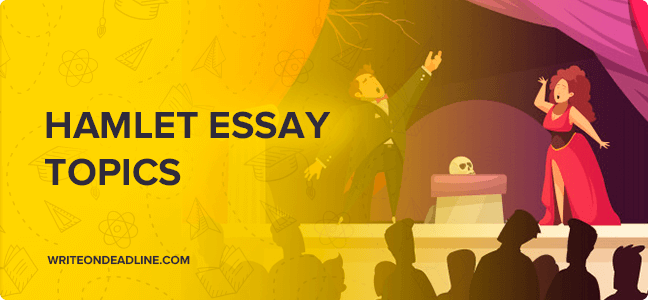
Table of Contents

What is a Hamlet Essay?
A Hamlet essay is an analytical piece that delves into the themes, characters, plot, motifs, or historical context of William Shakespeare’s iconic tragedy, “Hamlet”. This play, often touted as one of the greatest pieces of literature ever written, is rife with profound topics and subtle nuances. When writing an essay on “Hamlet”, students explore these intricacies, shedding light on the play’s enduring relevance and its multifaceted layers.
Choosing the Right Topic for Your Hamlet Essay: A Quick Guide
In choosing a Hamlet essay topic, consider what aspect of the play intrigues you the most. Is it the psychological torment of Hamlet, the play’s exploration of existentialism, or perhaps its political undertones? Reflect on the themes that resonate with you. Review the play and take notes on pivotal scenes or dialogues. Your passion will come through in your writing, making your essay more engaging. Moreover, ensure your topic is not too broad; narrowing it down will allow for a deeper analysis.
Hamlet Essay Topics to Spark Your Imagination
Character analysis.
- Hamlet : A Study in Paralysis and Procrastination
- Ophelia’s Descent into Madness
- The Dual Nature of King Claudius
- Gertrude: Victim or Villain?
- Horatio: Hamlet’s Constant in a Chaotic World
Thematic Concerns
- The Play Within the Play: Exploring Metatheatre in Hamlet
- Madness vs. Sanity: A Thin Line in Elsinore
- Revenge and Its Consuming Nature
- Death and Decay: Imagery and Symbolism
- Betrayal and Loyalty: Conflicting Values
Symbolism and Motifs
- The Significance of Yorick’s Skull
- The Poisoned Sword and Cup: Instruments of Fate
- The Role of the Ghost in Driving the Plot
- Flowers in Ophelia’s Hands: More Than Just Bloom
- The Omnipresent Notion of Eavesdropping
Historical and Contextual Analysis
- Elizabethan Beliefs About Madness as Reflected in Hamlet
- Hamlet and the Renaissance Man
- The Influence of Greek Tragedy on “Hamlet”
- Political Strife and Its Reflection in Elsinore
- “Hamlet” in the Lens of Protestant Reformation
Comparative Studies
- “Hamlet” and “Oedipus Rex”: Tragedies of Fate
- The Role of Women in “Hamlet” vs. “Macbeth”
- How Film Adaptations Have Interpreted Hamlet’s Soliloquies
- Modern Interpretations of “Hamlet” in Popular Culture
- “Hamlet” and “Lion King”: From Denmark to Pride Rock
Character Exploration
- Hamlet : The Complexity of His Avenging Mission
- Ophelia: Between Love and Loyalty
- The True Intentions of Rosencrantz and Guildenstern
- Laertes: The Counterpart to Hamlet’s Revenge Quest
- Polonius: The Manipulative Councilor
Themes and Philosophical Inquiries
- The Ubiquity of Death in “Hamlet”
- Exploring Existentialism in Hamlet’s Soliloquies
- The Consequences of Deception and Secrets
- The Tragedy of Miscommunication in Elsinore
- Corruption and Moral Degradation in the Danish Court
Symbolism and Literary Devices
- The Role of Ghosts in Elizabethan Drama and “Hamlet”
- The Significance of the Play-within-a-Play Scene
- The Use of Mirrors and Reflections in Character Dynamics
- Gardens as Symbols of Decay and Corruption
- The Sea and its Symbolic Representations
Structural Analysis
- The Role and Impact of Soliloquies in “Hamlet”
- The Use of Foreshadowing in the Tragedy’s Climax
- The Dramatic Ironies that Pervade the Play
- The Significance of Off-Stage Actions in “Hamlet”
- The Role of Acts and Scenes in Pacing the Drama
Comparative Analyses
- Contrasting “Hamlet” with Other Shakespearean Tragedies
- “Hamlet” and “Othello”: Exploring Jealousy and Betrayal
- A Comparative Study of “Hamlet” and its Sources
- The Transformation of the “Hamlet” Story Through Time
- “Hamlet” vs. “Romeo and Juliet”: Love in the Midst of Tragedy
Modern Interpretations and Adaptations
- “Hamlet” in Today’s Pop Culture References
- Cinematic Interpretations of “Hamlet”: From Olivier to Branagh
- “Hamlet” in Non-English Theater: A Global Perspective
- Updating “Hamlet”: The Challenges and Rewards
- The Influence of “Hamlet” on Modern Dramatic Writing
Feminist Perspectives
- The Role and Representation of Women in “Hamlet”
- Gertrude: Passive Queen or Calculative Player?
- Ophelia’s Voice and Silence: A Feminist Reading
- The Paternal Controls Over Ophelia and Gertrude
- Women’s Agency in “Hamlet”: A Critical Exploration
Historical and Contextual Insights
- The Influence of Shakespeare’s Life Events on “Hamlet”
- “Hamlet” and the Elizabethan Worldview on Ghosts and the Supernatural
- Political Undertones in “Hamlet”: The State of Denmark
- Elizabethan Theater and its Reflection in “Hamlet”
- “Hamlet” and the Reflection of Renaissance Humanism
Psychological Angles
- Hamlet’s Oedipal Complex Explored
- The Mental State of Characters: Who’s Truly Mad?
- The Psychological Effects of Grief and Loss in “Hamlet”
- Fear, Paranoia, and Suspicion: A Psychological Dive into Elsinore’s Inhabitants
- Analyzing “Hamlet” Through the Lens of Freudian Psychoanalysis
Miscellaneous Topics
- The Role of Fate vs. Free Will in “Hamlet”
- The Ethical Implications of Revenge in “Hamlet”
- Exploring Religion and Morality in “Hamlet”
- The Concept of Honor in “Hamlet”
- The Nature of True Friendship in the Play
Narrative Techniques and Structure
- The Role of the Chorus in “Hamlet”: Absence and Implication
- Non-linear Storytelling in “Hamlet”: Flashbacks and Memories
- The Significance of Interludes and Their Impact on the Main Plot
- Parallel Plots in “Hamlet”: Subplots and Their Relation to the Central Narrative
Cultural Perspectives
- “Hamlet” from an Eastern Philosophical Perspective
- “Hamlet” in the Context of African Oral Traditions
- Exploring “Hamlet” from a Postcolonial Point of View
- The Play’s Universality: Why “Hamlet” Resonates Globally
Philosophical and Ethical Discussions
- “To Be or Not To Be”: Hamlet’s Exploration of Nihilism
- The Dichotomy of Action vs. Inaction in “Hamlet”
- Ethical Ambiguities: Is Hamlet Justified in His Actions?
- Determinism and Free Will in “Hamlet”
Performance and Stagecraft
- The Evolution of “Hamlet” Stage Productions Over the Centuries
- Modern Theatrical Interpretations of “Hamlet” and their Relevance
- Challenges of Portraying Hamlet: An Actor’s Perspective
- The Role of Stage Directions in Shaping “Hamlet’s” Performances
Secondary Characters and Their Significance
- Fortinbras: The Silent Counterpart to Hamlet
- Gravediggers in “Hamlet”: Humor Amidst Tragedy
- Osric: A Reflection of Elsinore’s Decaying Morality
- Marcellus and Bernardo: The Unsung Heroes of Elsinore
Get Writing Help
Struggling with your “Hamlet” essay? At writeondeadline.com , we offer top-tier essay writing services tailored to your needs. Allow our expert writers to bring your insights to life, delivering a masterpiece worthy of Shakespeare himself. Order your essay now!
Useful References
- William Shakespeare’s Hamlet – Full Text
- Royal Shakespeare Company’s Guide to Hamlet
- Shakespeare Online: Hamlet Essays
- BBC’s In-Depth Look at Hamlet

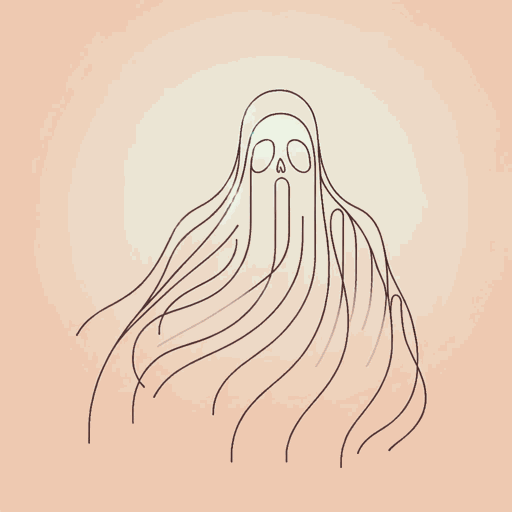
48 pages • 1 hour read
A modern alternative to SparkNotes and CliffsNotes, SuperSummary offers high-quality Study Guides with detailed chapter summaries and analysis of major themes, characters, and more.
Act Summaries & Analyses
Acts III-IV
Character Analysis
Symbols & Motifs
Important Quotes
Essay Topics
Further Reading & Resources
Discussion Questions
Hamlet is deeply concerned with questions of truth and falsehood. What role does truthfulness play in the events of the story, and how is truthfulness shown to be more complex than it might at first seem?
In the middle of Hamlet, we watch a play within a play, “The Mousetrap.” But first, we hear Hamlet’s opinions on theater: The stage should hold up a mirror to nature. What role does “The Mousetrap” play in Hamlet ’s examination of the nature of reality?
Hamlet’s lines, particularly when he is pretending to be mad, are riddled with puns and wordplay. What does the play have to say about the slipperiness of language?

Don't Miss Out!
Access Study Guide Now
Related Titles
By William Shakespeare

All's Well That Ends Well
William Shakespeare

A Midsummer Night's Dream

Antony and Cleopatra

As You Like It

Henry IV, Part 1

Henry IV, Part 2

Henry VI, Part 1
Henry VI, Part 3

Julius Caesar

Love's Labour's Lost

Measure For Measure

Much Ado About Nothing

Featured Collections
Books Made into Movies
View Collection
British Literature
Elizabethan Era
Shakespeare
Hamlet Essay Topics & Samples
It can be argued that William Shakespeare’s Hamlet is the most significant play ever written and performed. It is much more than just a play about revenge as it deals with universal philosophical questions. Life and death, love and betrayal, friends, and woes are all explored through the mind of the protagonist, Hamlet. In this article, you will see a plethora of Hamlet essay prompts to focus on. Besides, you will find some good Hamlet essay ideas with examples to inspire your writing.
Our specialists will write a custom essay specially for you!
Hamlet Essay Topics
- A theme of suicide in the play . This Hamlet essay aims to examine a suicide theme from a moral, religious, and existential perspective. Does Hamlet contemplate an idea of suicide? What stops Hamlet from committing it? Students should pay close attention to “to be or not to be” soliloquy.
- Elaborate on the relationship between Gertrude and King Hamlet. In this Hamlet essay, you can analyze what the reader knows about their marriage. What was Gertrude’s reaction to her husband’s death? Did she see the Ghost in the scene with Hamlet? Could she have pretended that she didn’t? Discuss how we can explore the status of women in Elizabethan times through Gertrude’s behavior.
- The question of genre in Hamlet. In his timeless Hamlet , Shakespeare does not follow the rules of a tragic play or a revenge tragedy. So, it makes it quite hard to say what genre is Hamlet. However, in your essay, you can focus on explaining how Hamlet is a tragic hero. Explain what makes Hamlet a unique tragedy.
- A theme of madness in Hamlet. This theme is by far the most prevalent in the entire play. Moreover, it overlaps with other topics in Hamlet , such as death, deception , love, and betrayal. Students can analyze both the nature of Hamlet’s forced insanity and Ophelia’s madness.
- An analysis of Shakespeare’s writing style in Hamlet. In this Hamlet essay, students can analyze the language and literary devices that Shakespeare used. What does Hamlet’s way of speaking tell about him? Why are some lines written in prose, while others in verse? Analyzing these topics can help you to get started.
- A motif of incest in Hamlet. Throughout the play, there are plenty of sexual references and allusions in Hamlet . Critics found an incestuous desire between Claudius and Gertrude, Gertrude and Hamlet. Even Laertes ’ attitude towards Ophelia and her love life can be interpreted this way. What does this motif contribute to Hamlet? Discuss Hamlet’s obsession with Gertrude’s sexual relationships from the Freudian perspective.
- Hamlet’s attitude towards women. The only women in the entire play are Hamlet’s mother, Gertrude, and love interest, Ophelia . Both of them are very close to Hamlet, even though he regularly verbally abuses them. However, the protagonist does not merely attack their qualities—the whole Hamlet’s tone is misogynistic. What makes him hate women? Discuss it in your Hamlet essay.
- A theme of revenge in Hamlet. This theme is one of the most fruitful Hamlet essay topics. It unites three characters: Hamlet, Laertes, and Fortinbras. Why is Hamlet the only character who hesitates to act? Elaborate on his internal conflict concerning vengeance and how other mentioned characters serve as his foils. What makes Hamlet a unique revenge tragedy?
- An existentialist reading of Hamlet. To elaborate on a more challenging Hamlet research paper topic, choose this one. Is Hamlet an existentialist? Why Hamlet’s inability to act can be seen as a form of action? How can existentialist philosophy provide a fresh view of the play?
- Compare and contrast Hamlet and Laertes. Hamlet and Laertes have very different personalities yet share a lot of traits. Discuss their attitude towards women, their parents, and each other. How does Shakespeare portray the similarities between the characters? Why does Laertes serve as Hamlet’s character foil?
Hamlet Essay Samples
In this section, you will see several essay samples on writings of William Shakespeare to get inspired from. You can also find the description of each essay below.
- Literature Analysis: Hamlet’s Appearance Vs. Reality Shakespeare’s Hamlet depicts the tensions between appearance and reality. Characters’ emotions and actions often appear to be real, when in fact, they are not. The topic is analyzed via Hamlet, Claudius, Polonius, Rosencrantz, and Guildenstern. In the play, Shakespeare highlights the deceitfulness of these characters.
- Revenge in the Play “Hamlet, Prince of Denmark” The main character of the play, Hamlet, is used to depict the theme of revenge. The essay demonstrates that he was avenging his father with the motivations for revenge, the process of revenge, and the actual revenge. These stages are described by examples from the play and literary analyses.
- Literature Analysis of Hamlet’s Soliloquies The paper analyses Hamlet’s qualities based on his monologues. His character is well portrayed through his soliloquies. The essay takes on his religiosity, the fear of damnation, the want of justified revenge, the talent of critical thinking, and his flaws.
- Women Role in Shakespeare’s Othello and Hamlet These Shakespearens plays portrayed women as one of the significant causes of conflict. The essay examines their roles in both pieces and compares their actions, age, and depiction.
- Hamlet’s Costume Design Scenic design is a vital part of any play. It communicates the mood through illustrations of climate conditions, people’s statuses, and political instability. Thus, the paper examines the importance of colors and clothes design and how they reveal the characters’ emotions.
- Modern Film Version of “Hamlet” by Shakespeare The essay describes the modern film version of Hamlet and why it is worth seeing. The author mentions the excellent acting, modern-dress production, and single-camera setup.
- Ophelia in “Hamlet” by William Shakespeare Ophelia’s unhealthy love for Hamlet and consequent tragedy are stressed in the present paper. She is the embodiment of tragedy in the play. The author discusses her actions by using lack of maternal guidance, lack of exposure, and naivety.
- Share to Facebook
- Share to Twitter
- Share to LinkedIn
- Share to email

Shakespeare’s play is a tale of tragedy and revenge, and this Hamlet study guide will focus on this. In the present articles, we will discuss the literary piece, its plot, themes, and symbols. Additionally, you will get to know more about Shakespeare’s writing style and Hamlet’s genre. Hamlet Key Facts...

The Tragedy of the Prince of Denmark, often shortened to Hamlet, is central to William Shakespeare literary works. The play opens at night in the cold dark castle of Elsinore in Denmark. The setting plays a significant role in the overall understanding. In a play, as complex as plot of...

Even today, Hamlet characters can be seen as unique and well-defined, as well as the absolute majority of key figures in the dramatic works of William Shakespeare. They are why this Shakespeare’s tragedy became as famous as it is, so they deserve a thorough examination. This article analyzes all the...

Hamlet’s themes are crucial to see through if you wish to understand what the author tried to say. Famous works of William Shakespeare are staged even today, centuries after being written. They remain relatable and influential, regardless of period. The themes in Hamlet are one of the primary reasons why,...

There are several symbols in Hamlet that are crucial for understanding the underlying message of the play. They provide a more in-depth look into the characters’ minds, illustrating their emotions and sufferings. Besides, symbols and imagery reveal how the inner turmoils affect the world around. So, examine the symbolism in...

Antigone by Sophocles is a tragedy based on Greek mythology. The new king of Thebes, Creon, decides not to bury Polynices, a warrior who died fighting with his brother over the throne. Meanwhile, Antigone cannot accept the fact that her brother’s funeral is violated and buries him herself. In this...
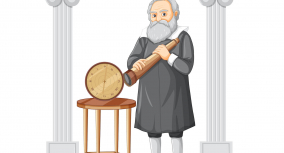
Since the whole plot development starts with Creon not burying Polynices properly, it is only logical to assume that he creates the main conflict. Antigone believes that every man has to be buried according to their traditions; otherwise, it is disrespectful to the gods. Therefore, she stands up against Creon’s...

Sophocles describes the period right after the war for Thebes in which two brothers killed each other. The next day, Creon, who becomes a new king, gives strict orders. Antigone takes her sister out of the city to tell her the news. That is how Ismene gets to know that...

In Sophocles’ play, Antigone has her own reasons to stand by her decision to bury Polynices. Even though it is the king’s order, she does it anyways. The main reason Antigone goes against the law is that the gods’ will is always stronger than some man’s words. Therefore, Creon’s orders...

In Antigone, there are not many characters that change somehow throughout the play. For example, Antigone remains stubborn till the very end. Creon, on the other hand, alters his decision by the end. Therefore, he is the main dynamic character in the play. Apart from him, Ismene also shows some...

In Sophocles’ play, when it appears that it was Antigone who broke the king’s law, Creon still goes on to arrest her. It does not matter to him that she is his son’s fiancé and simply a woman. Creon sees himself as the highest power, and the order should be...

The main difference between the two sisters is that Ismene is much more obedient than Antigone. The main heroine tries her best to go against the king’s will, while Ismene refuses to do it. Moreover, Antigone is never seen as feminine and beautiful as her sister. It makes her jealous,...
HAMLET is one of those mentioned in “Fifty Books the World Can Do Without”. Discuss.🤭
Resources you can trust
24 A Level essay questions
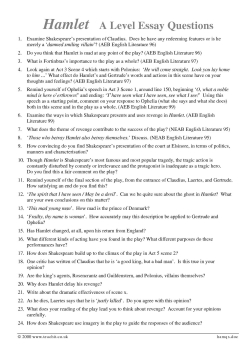
All reviews
Have you used this resource?
Resources you might like
- Junior Cert
- Elizabeth Bishop
- Emily Dickinson
- Seamus Heaney
- Thomas Kinsella
- Derek Mahon
- All 2014 guides on CD
- Sylvia Plath
- Eavan Boland (LC 2012)
- Patrick Kavanagh (LC 2012)
- Adrienne Rich (LC 2013)
- Gerard Manley Hopkins (LC 2013)
- Cancelled Order
- Thank You for your order
Hamlet – typical questions
It’s difficult to predict what questions will come up for the Shakespearean play. A couple of years ago a lot of multinational companies in Ireland complained that graduates were increasingly finding it difficult to critically analyse data – in other words, to think about large amounts of information and pick out what mattered. Simultaneously, concerns were raised about grade inflation – the number of people achieving high grades in school and college exams kept increasing. The population weren’t getting any cleverer, so the exams must be getting easier.
The examinations commission responded and as a result the more predictable (‘there’s always a character Q’ or ‘personal response’ in poetry) questions are disappearing. There is no need to despair however. You know plenty – you just need a strategy to pick out what matters on the day.
If you figure out how to do this then you’ll also have developed a skill that will last you a lifetime, and one which multinational corporations will be looking for when you graduate college and are looking for a job. So it’s not all a big waste of time even if it feels like that now!
First of all let’s look at the broad categories questions usually fall into.
You must be able to discuss the following when it comes to characters :
- his state of mind (mostly revealed in soliloquies)
- his ‘madness’
- his delay (procrastination)
- his nobility (is he a good man?) / strengths & weaknesses
- a tragic hero or an anti-hero?
- his relationship with Claudius (the struggle between them)
- his relationship with women (Gertrude & Ophelia) & treatment of them
CLAUDIUS (a good king? a villain? or an admirable villain?)
GERTRUDE (a good mother despite her flaws? a negative portrayal of women?)
OPHELIA (an innocent victim or a weak and foolish girl? a negative portrayal of women?)
I seriously doubt (please don’t let this come back to haunt me) they’ll ask you to discuss one of the minor characters like Polonius or Horatio, but be able to write one paragraph on each as they would be relevant in discussing good versus evil or loyalty and betrayal. You also need to be able to write one paragraph on Fortinbras and one on Laertes for the theme of revenge.
The major themes in the play are:
- Revenge (and justice)
- Good versus Evil
- Loyalty & Betrayal
- Appearance versus Reality (Deception)
- Power & Corruption
For each theme – no matter what the wording – ask yourself
- WHO does this theme apply to?
- HOW / WHY does this character have to deal with this issue?
- Do they CHANGE over the course of the play?
- Are there any SCENES which highlight this theme specifically?
- What are our FINAL IMPRESSIONS of this issue?
Asking these questions – and being able to come up with answers yourself – is what critical analysis is all about. Also, anything you take the time to figure out for yourself sticks in your brain. Reading someone else’s ideas just isn’t quite the same!
Open questions ask you to discuss the entire play – not the plot, but your experience of watching/studying the play.
- Favourite / most dramatic scene.
- Relevance to a modern audience.
- Although Hamlet is a tragedy, it is a play with many memorable comic moments – discuss.
- Hamlet is a dark, depressing and pessimistic play – discuss.
Style questions are quite difficult and pretty rare in the new course (so far) – they ask you to look at how the play is written.
- Language & imagery.
- Dramatic function of various characters (how they make the plot more compelling).
No matter how the question is phrased on the day, you must stay calm. Keep using the words from the question and synonyms .
Write down the 5 key Q’s – 1. WHO? 2. HOW/WHY? 3. CHANGE? 4. SCENES? 5. FINAL IMPRESSIONS?
You must quickly plan your 6 paragraphs.
As you are writing, if one paragraph gets too long, turn it into two, no big deal.
Beware of just starting to write and writing until the hour is up (writing whatever comes into your head without doing any planning). This stream of consciousness approach tends to lead to waffle, plot summary and lots of irrelevant information which has nothing to do with the question.
Keep the question in your mind at all times as you write. Remember you must demonstrate that the information you are including is relevant to the question being asked.
If any of the questions above freak you out why not try to figure out what you might discuss now, rather than on the day? You don’t have to write the full essay, you could just plan your 6 paragraphs and think about what quotes you might include.
2 responses to “ Hamlet – typical questions ”
Recent posts.
- A long slow goodbye…
- Lear’s journey
- Some themes in Lear…
- King Lear – Plot Chronology
- King Lear quotes (in translation!)
- Justice in King Lear – how to construct an answer…
- The Old Warrior and Me
- Single text options…
- Tackling the Comparative
- Reading Shakespeare (Othello)
- Game Based Learning
- Originality – Freshness – Energy – Style
- Discussions
- Comprehensions
- Comparative
- Studied poetry
- Unseen poetry
- Media Studies
- Uncategorized
Affiliations
Nominations.

Hamlet Essays Questions and Answers Grade 12 pdf
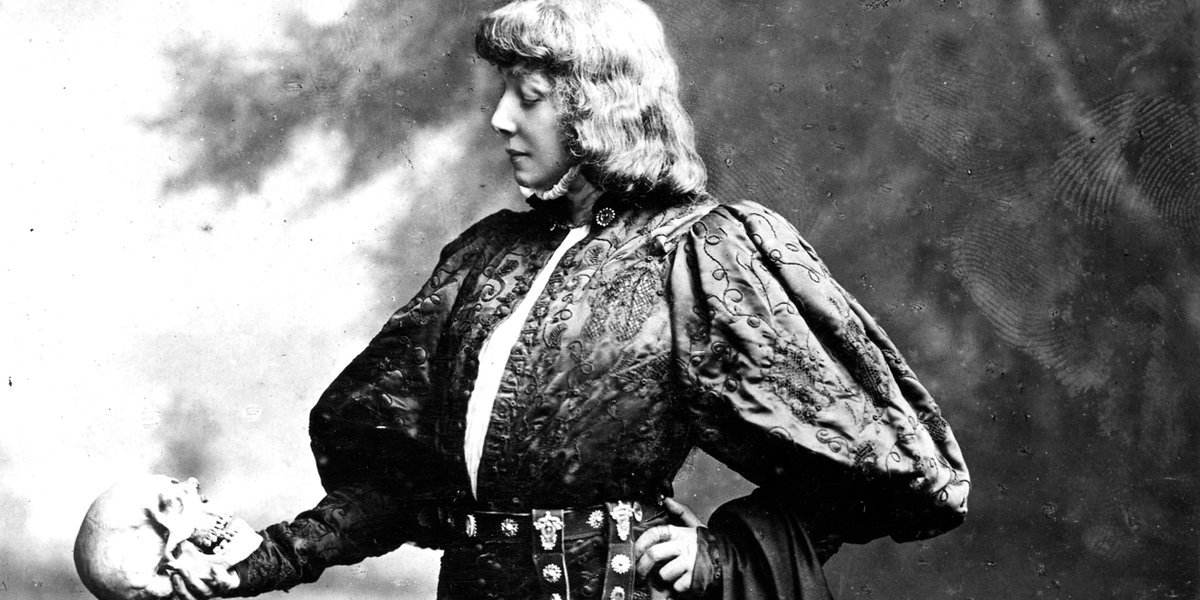
Hamlet Essays Questions and Answers Grade 12 pdf: There are contextual questions as well as essay questions for The Tragedy of Hamlet, Prince of Denmark .
Table of Contents
Quick FACTS about Hamlet
Who wrote Hamlet?
William Shakespeare
What is the Genre of the Story?
Tragedy; revenge tragedy
Who is the Protagonist?
Prince Hamlet
Explain the major conflict that happens in the story
Hamlet feels a responsibility to avenge his father’s murder by his uncle Claudius, but Claudius is now the king and this complicates matters for Prince Hamlet. Moreover, Hamlet has doubts about whether he can trust his father’s ghost, and whether killing Claudius is the appropriate thing to do.
Explain the rising of the action in the story
The ghost appears to Hamlet and tells Hamlet to avenge his murder; Hamlet pretends to be mad to his hide intentions; Hamlet stages the mousetrap play; Hamlet is reluctant to take the opportunity to kill Claudius while he is praying.
What happens in the climax?
When Hamlet violently stabs Polonius through the arras in Act III, scene iv, he brings himself into unavoidable conflict with the king (Claudius). Another possible climax comes at the end of Act IV, scene iv, when Hamlet resolves to commit himself fully to violent revenge.
What is falling action of a story?
Hamlet is sent to England to be killed; Hamlet returns to Denmark and confronts Laertes at Ophelia’s funeral; the fencing match between Hamlet and Laertes; the deaths of the royal family.
What is the setting (time) for the story?
Elizabethan times . In and around the royal palace in Elsinore, a city in Denmark
Contextual question
In a contextual question, you are given an extract (about 25–30 lines) from the drama. You will then have to answer questions based on the extract. Some answers can be found in the extract. Other questions will test your understanding of other parts of the drama: plot, characters, symbols and themes. Some questions will require that you express your opinion about the drama.
Literary Essay Question
Writing literary essays is a skill requiring preparation, planning and practice. When answering literary essays, you do not re-tell the story. Instead , you need to focus on specific requirements of the set essay question. The number of paragraphs in your literary essay will depend on what the question requires.
Characters in Hamlet
Cl assification of characters according to social status
In Hamlet , the characters’ social standing plays an important role, especially in relation to the Great Chain of Being.
The nobility
This is the noble class, made up of the royal family and the courtiers, whose wealth and position in society were inherited. They had political power and owned most of the land. The nobles in the play include Prince Hamlet, Claudius, Gertrude, King Hamlet and the Fortinbrases.
The commoners
These are people who had no inherited titles or wealth. Most of them had little chance of improving their social status except through their relationships with the nobility. For example, Horatio, Hamlet’s university associates (Guildenstern and Rosencrantz), Polonius and his children, the guards and the grave diggers, all belong to this class.
Some of the commoners are used to provide humour and to comment on the actions of the other characters are doing , e.g. in the graveyard scene.
The clergy in Elizabethan times were given a special role in society. In Hamlet , the priest performs the last rites and burials, as seen during Ophelia’s burial.
Hamlet Essay Question 1
Hamlet’s behaviour throughout the play has unintended consequences. Critically discuss the extent to which you agree with the above statement. Your response should take the form of a well-constructed essay of 400–450 words (2–21⁄2 pages).
How to answer the above essay question: Answer Guide
Candidates might argue that this statement is not entirely true and discuss how Hamlet’s behaviour has either intended or unintended consequences or they might offer a mixed response.
- From the time he learns of his father’s murder, Hamlet is obsessed with the need to avenge his death. This sets him on a course that has many unintended consequences.
- Hamlet intends for his antic disposition to mislead his enemies and to allow him to investigate the Ghost’s accusations. It serves, however, to make Claudius suspicious of him and leads to Rosencrantz and Guildenstern’s spying on him and ultimately their deaths.
- Hamlet’s introspection, self-doubt and anxiety cause him to procrastinate, thus giving Claudius the opportunity to act against him.
- Although Hamlet has the perfect opportunity to kill Claudius while he is at prayer, he decides against it, as he does not want Claudius’s soul to ascend to heaven. His delay gives Claudius time to come up with a plan to kill him. Realising that Hamlet poses a threat to him, Claudius sends Hamlet to England where he will be executed by the English king.
- Hamlet’s boarding of the pirate ship has the unintended consequence of enabling him to return to Denmark and escape execution.
- Hamlet unintentionally kills Polonius when he realises that he is being spied upon in his mother’s room. As a result, Laertes is determined to avenge his father’s death.
- Hamlet’s cruel treatment of Ophelia is a result of his disillusionment with his mother, and women in general. His brutal rejection of her and her father’s death at Hamlet’s hands cause Ophelia to descend into madness and she drowns soon after.
- In order to eliminate the threat that Hamlet poses to him, Claudius poisons Hamlet’s wine at the duel. Gertrude’s death after drinking the poison is a consequence that neither Hamlet nor Claudius could have predicted.
- Fortinbras’s becoming King of Denmark is another unexpected outcome of Hamlet’s commitment to revenge.
- Candidates might argue that much of what Hamlet does is orchestrated and that he has a very clear outcome in mind. They might refer to his deliberate act of feigning madness and his plan to stage a play that mirrors Claudius’s murderous and incestuous actions. Both these acts have the intended outcome of confirming Claudius’s guilt.
Hamlet Essay Question 2
Hamlet is responsible for his own tragic fate. Assess the validity of this statement. Your response should take the form of a well-constructed essay of 400–450 words (2–21⁄2 pages).
- Below is the basis for answering this essay. Use the following as a guideline only. However, also allow for answers that are different, original and show evidence of critical thought and interpretation.
- A range of examples may be used by the candidates to support their arguments.
A mixed response would demonstrate a comprehensive understanding of the text.
- Hamlet struggles to reconcile his conscience with the need to avenge his father’s death. His dilemma is that he is prone to philosophic speculation and a desire to make judgements based on reason. He vacillates rather than reacts. While some might construe Hamlet’s behaviour as weak and see him as responsible for his own fate, others might argue that Hamlet’s vacillations are a consequence of his goodness.
- Hamlet has no control over certain events: the murder of his father, Claudius’s ascension to the throne and his marriage to Gertrude.
- Hamlet acknowledges that fate plays a role in the way in which matters unfold: he says that ‘there’s a divinity that shapes our end’. This suggests that, although Hamlet’s flaws may contribute to his downfall, there are elements beyond his control.
- Candidates might argue that Hamlet’s assumed madness is a fatal error of judgement that contributes to the tragic consequences.
- Candidates might argue that Hamlet is solely responsible for his fate because of his self-pitying attitude and his procrastination. The consequent train of events is a result of his failure to act timeously. He ought to have disclosed the presence of the Ghost to Gertrude and then perhaps events might have taken a different turn.
- Candidates who argue that Hamlet has no control over events will focus on issues of fate and/or restrictive circumstances rather than Hamlet’s decisions.
- Fate plays a role when the ship Hamlet travels on is attacked by pirates, resulting in his being saved and returning to Denmark.
- The machinations of Claudius, his collusion with Rosencrantz and Guildenstern, as well as with Polonius and Laertes, make it impossible for Hamlet to be held solely accountable for the tragic unfolding of events.
- When Hamlet does act, he does so impulsively (e.g. the killing of Polonius and his role in the killing of Rosencrantz and Guildenstern). He avoids acting with premeditation. He struggles to react to the Ghost’s request.
Hamlet Essays Questions and Answers Grade 12 pdf Downloads
Download questions and answer guides for Hamlet below:
Questions and Answers
My Courses has a large Questions and Answers repository for the most popular High School and Tertiary Schools subjects. This comes in handy when doing your revision or preparing for exams, tests, research tasks, and assignments.
Ask Us a Question and we will send you the Answer Guide
[super_form id=”33574″]

IMAGES
VIDEO
COMMENTS
107 Exceptional Hamlet Essay Topics: Questions & Prompts. Every academic paper starts with a captivating idea, and Hamlet research paper or essay shouldn't be an exception. In the list below, our team has collected unique and inspiring topics for you. You can use them in your writing or develop your own idea according to the format.
5. Suicide is an important theme in Hamlet. Discuss how the play treats the idea of suicide morally, religiously, and aesthetically, with particular attention to Hamlet's two important statements about suicide: the "O, that this too too solid flesh would melt" soliloquy (I.ii.129-158) and the "To be, or not to be" soliloquy (III.i ...
Hamlet Essay Questions. 1. Hamlet is widely hailed as the first modern play in the English language. Which characteristics of its central character might account for this label? Hamlet is considered the first modern play partly because of the psychological depth of its main character -- Hamlet suffers from melancholy, self-doubt, and even ...
ESSAY QUESTIONS ON HAMLET Note: Some of the questions are examination-type questions; others are questions for learners to answer as a means to understanding the play. Teaching tip: It is all too easy to deal with so many essay topics during teaching that one ends up without clear topics to set as examination questions. Solution? Choose three ...
140 Hamlet Essay Topics. One of Shakespeare's most iconic plays is Hamlet. Set in Denmark, it tells the story of Hamlet, a young prince who becomes aware of his father's death and seeks revenge against his mother Gertrude by killing her new husband, Claudius. The play is a thrilling roller coaster ride of emotions, with themes such as lust ...
Suggested Essay Topics. 1. Contrast the attitudes towards the death of the old King as expressed by Claudius and Hamlet. 2. Compare the advice given to Ophelia by Laertes and that given by ...
353 Hamlet Essay Topics & Ideas. Hamlet essay topics delve into the deep, convoluted world of Shakespearean tragedy, focusing on various themes, such as revenge, mortality, madness, and moral corruption. These topics provide a rich exploration of Hamlet's internal struggles and existential crises, his complex relationships with characters ...
A Hamlet essay is an analytical piece that delves into the themes, characters, plot, motifs, or historical context of William Shakespeare's iconic tragedy, "Hamlet". This play, often touted as one of the greatest pieces of literature ever written, is rife with profound topics and subtle nuances.
Hamlet: Essay Topics 1) Conflict is essential to drama. Show that Hamlet. presents both an outward and inward conflict.. 2) How do Hamlet's seven soliloquies reveal his character? 3) Is Hamlet primarily a tragedy of revenge? 4) Discuss Hamlet's relationship with Gertrude. 5) How important is the general setting of Denmark to the overall play. 6) Of what significance is Ophelia to Hamlet?
Essay Topics. 1. Hamlet is deeply concerned with questions of truth and falsehood. What role does truthfulness play in the events of the story, and how is truthfulness shown to be more complex than it might at first seem? 2. In the middle of Hamlet, we watch a play within a play, "The Mousetrap.". But first, we hear Hamlet's opinions on ...
Easy Hamlet Essay Topics. Unveiling the Spectral Layers: Derrida's Deconstructive Exploration of Ghostly Presence in Hamlet. Explore Hamlet's depths through Lacan's psychoanalytic insights. Rorschach test-like exploration of madness in Hamlet. Delve into Ophelia's role as a potential feminist icon or victim of patriarchy.
20 Good Topics for a Hamlet Essay. The role of revenge in Hamlet. The role of power and politics in Hamlet. The role of women in Hamlet. The symbolism of the ghost in Hamlet. The theme of betrayal in Hamlet. The significance of the play within a play in Hamlet. The role of religion in Hamlet.
Most likely, Hamlet's decision to feign madness is a sane one, taken to confuse his enemies and hide his intentions. On the other hand, Hamlet finds himself in a unique and traumatic situation, one which calls into question the basic truths and ideals of his life. He can no longer believe in religion, which has failed his father and doomed ...
Revenge in the Play "Hamlet, Prince of Denmark". The main character of the play, Hamlet, is used to depict the theme of revenge. The essay demonstrates that he was avenging his father with the motivations for revenge, the process of revenge, and the actual revenge. These stages are described by examples from the play and literary analyses.
Hamlet himself raises the possibility that the Ghost is actually a demon impersonating his father, which certainly seems possible, though we never see any further evidence to support this idea. In Act 3, scene 4, when the Ghost appears to Hamlet (and the audience) but not to Gertrude, Gertrude sees the Ghost as a sign of Hamlet's madness.
William Shakespeare. Title. Hamlet. 24 essay questions on Shakespeare's Hamlet ( from a range of legacy specifications) to help students to prepare for their exams and to develop their timed essay planning and writing skills. 30.03 KB.
Essay Questions for Hamlet. Jason has 20 years of education experience including 14 years of teaching college literature. Shakespeare's Hamlet offers students a variety of opportunities to grow as ...
Hamlet is a dark, depressing and pessimistic play - discuss. Style questions are quite difficult and pretty rare in the new course (so far) - they ask you to look at how the play is written. Language & imagery. Dramatic function of various characters (how they make the plot more compelling). No matter how the question is phrased on the day ...
QUESTION 10: HAMLET - ESSAY QUESTION • Below is the basis for answering this essay. Use the following as a guideline only. However, also allow for answers that are different, original and show evidence of critical thought and interpretation. • A range of examples should be used by the candidates to support their arguments.
Hamlet Essay Question 2. Hamlet is responsible for his own tragic fate. Assess the validity of this statement. Your response should take the form of a well-constructed essay of 400-450 words (2-21⁄2 pages). How to answer the above essay question: Answer Guide. Below is the basis for answering this essay. Use the following as a guideline only.
Hamlet's tragic flaw of indecisiveness, his tendency to overthink, and his inclination to prioritize contemplation over action serve as strong evidence of his internal weaknesses being the root cause of his tragic demise. Hamlet's indecisiveness is a prominent characteristic that contributes to his downfall.